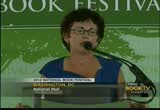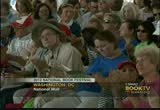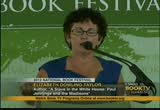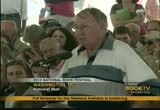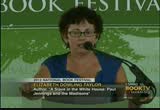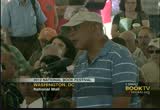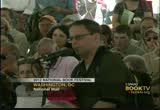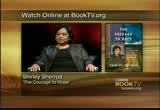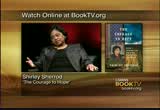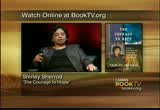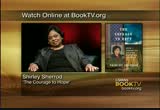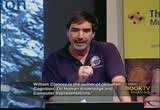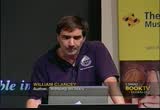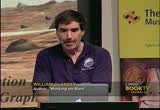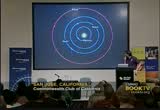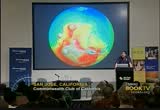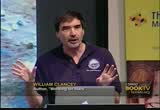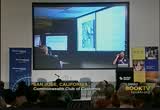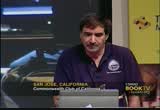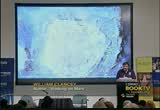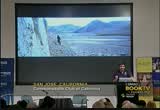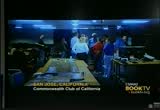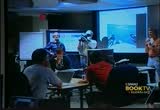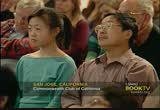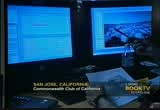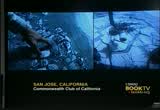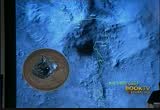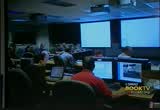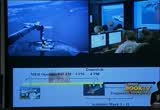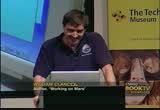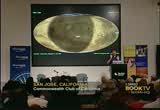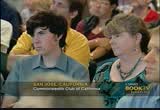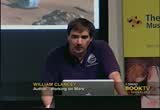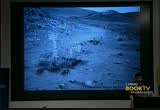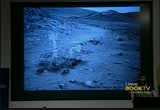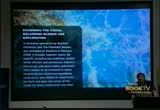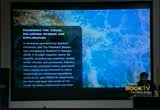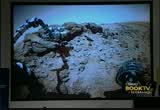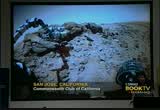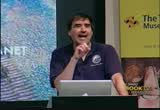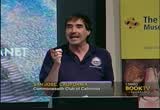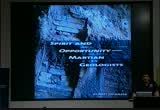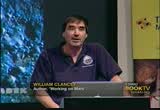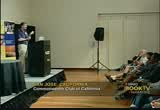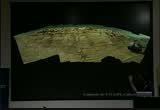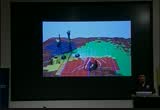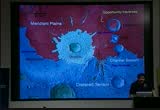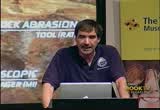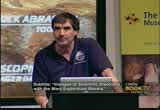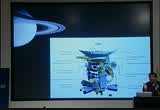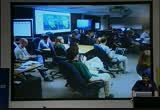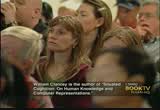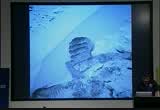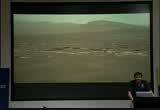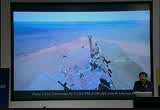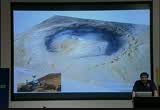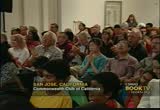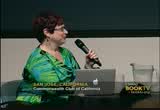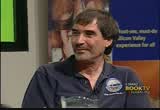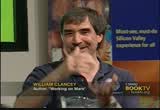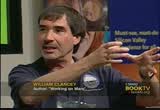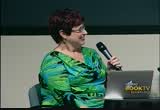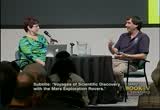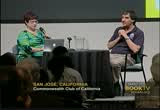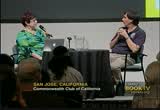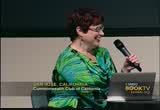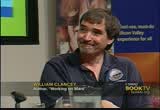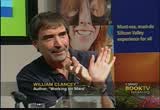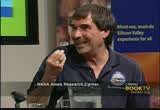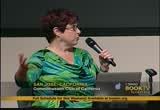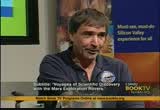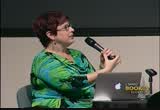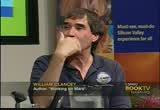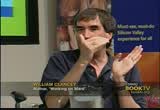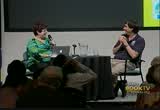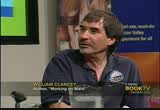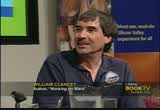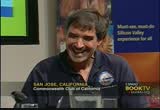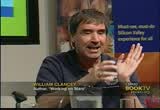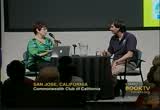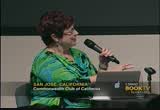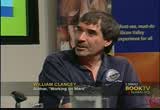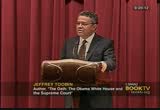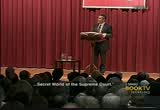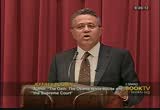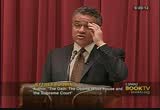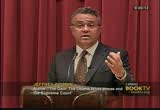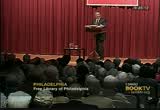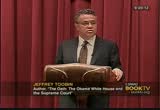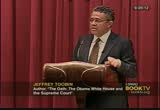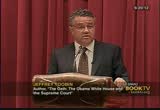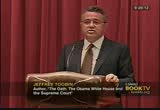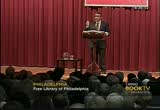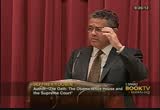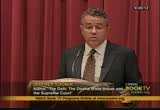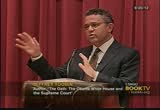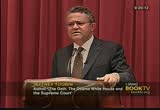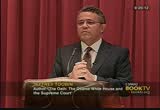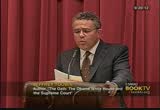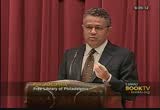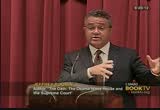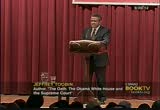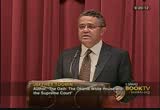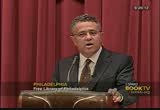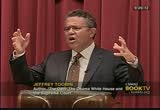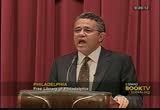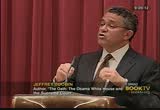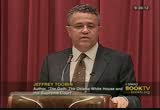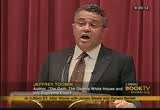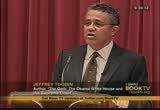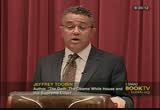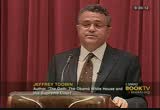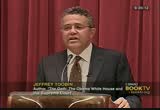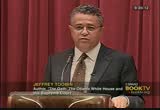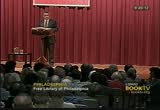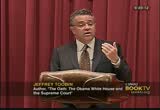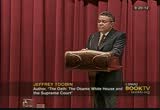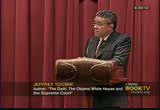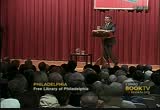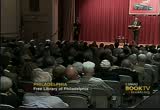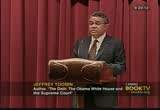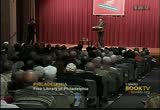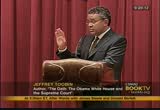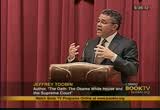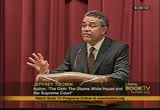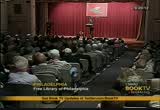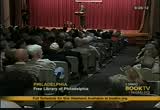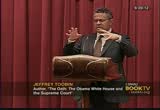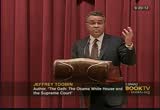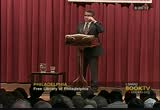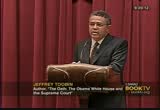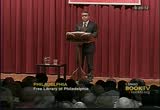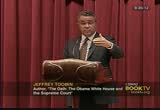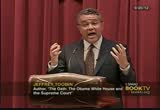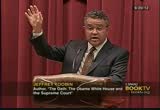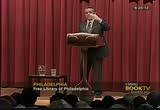tv Capital News Today CSPAN October 8, 2012 11:00pm-2:00am EDT
11:00 pm
[inaudible conversations] >> good afternoon. i am a 1-time author, and i am r thrilled to be here. [applause]or of this was a true labor of love. r i researched my topic for threee years and spent a year plus a writing it, and it is humbling and gratifying to see it be so well received. be and to be following walter isaacson, robert caro, and tony horwitz. caro, [applause] dop i came to develop a strong interest in paul jennings when a
11:01 pm
was director of education at james madison's month bill yeare in virginia.viinia. i was familiar with jennings' f ore considered by the white house historical association tof be the first memoir of life in the white house.nocences of jams madison," and as the title implies, it's really more about the so-called great man than it was about the author himself. my interest was in paul jennings. i set out to discover elements of his own biography to uncover the circumstances behind the original publication of the memoir in 1865 and to find an interview living direct descendents. a slave in the white house, paul jennings and the madisons is the
11:02 pm
story of paul jennings' unique journey from slavery to freedom. it played out in the highest circles of ideas and power. the white house, james madison's study. it's the story of paul jennings' complicated relationship with the father of the constitution, james madison. jennings was the constant servant in james madison's study, and as madison would discuss political subjects of the day, and during his retirement review his life's work designing and defending natural rights and self-government, paul was there to hear it all, and in the book, i developed the thesis that he was able to absorb the
11:03 pm
theoretical underpinnings that would allow him to identify his innate yearning for freedom as a natural right of man. jennings and madison developed a close bond of mutual respect, but they never were able to all together bridge that very deep divide between white ellite and black slaves. nevertheless, jennings had reason to expect that he would be freed by the terms of james mandyson's will. when it didn't happen, he was given to understand that madison and his wife, dolly, had come to an understanding before he died that she would free all the 100 montpelier slaves at her death, and, indeed, when she wrote a will of her own a few years
11:04 pm
after that, she had a term giving freedom to my man, paul, the only slave so treated. she and her son, by her first marriage, payne todd, who plays the role of foil to jennings in the book, payne todd had every advantage in life and squander them, jennings had no vangs, but managed to carve out a life of meaning, nevertheless. dolly and her son, payne, were selling slaves a mere two months after her husband died. now, in 1838, dolly madison moved back to washington. she owned a house on i lafayette square, a block and a half from the white house. jeepings was a member of the -- jennings was a member of the staff so like it or not, he went
11:05 pm
back to washington too. he had come of age in washington, serving on the madison domestic staff from age 10 to age 18. he had considered running away when that period of time was up, but instead, in the end, went back to montpelier. after all, that was his home too. he was not ready to never see his mother and other kin again, and he was the only eyewitness who left an account at the desk of james madison, but now, dolly madison was selling month peelier, and that separated jennings from his own wife and children. he had married an enslaved woman at a nearby plantation to month montpelier, and that meant their five chirp, as they came along, were owned by his wife's owner.
11:06 pm
they had barely been able to get together by once a week, and now, jennings was moving from virginia all together. his wife dies about the same time. now these are motherless children back in virginia. the youngest, only two years old. now, dolly is hurting financially, even after selling montpelier. she hires jennings out to work in the james pulp white house so he has a second experience working in the white house. at one point, the president and dolly gave him permission to go back to virginia to visit his family, but he stayed longer than dolly approved. now he was on her bad side. he determined that he could wait no longer for his otonomy r for
11:07 pm
his freedom. that's when he went to daniel webster, and even as a slave, it helped to know people in high places, and webster, jennings knew that webster had come to the aide of other slaves in need, but he said hi could never own a slave so his mo was to extend the purchase price and then have the newly freed individual work for webster in his household to pay off the purchase price, and that's the deal that he struck with jennings. dolly sold jennings for $200. webster allowed jennings to pay back the purchase price at the rate of $8 a month. he freed him immediately. finally, at age 48, paul jennings is a free man.
11:08 pm
his story after his freedom is as compelling as the one before that event. he became a leading member of the washington free black community, and in 1848, he was an operative in an underground railroad activity that turned out to be the largest scale ever attempted slave escape known to historian as the pearl episode. 77 enslaved men, women, and children of washington, including a run away teenage slave of dolly madison's named ellen stuart, boarded a scooter and hid themselves hoping to make it to freedom in the north. it was not to be. the plan was foiled by contrary
11:09 pm
winds and by a turncoat in the black community. this schooner left the harbor, but immediately there were light winds on the river that really slowed the vessel down, but when it got to chesapeake, the winds were too rough to enter the bay and had to hunker down. with the informant, that meant the white owners in washington became aware sooner rather than later. this was a sunday now, that their slaves had master minded working with white northern abolitionists as well as local black operatives like paul jennings, an escape, and they were after them, found them, and pulled the schooner back to washington as well as the human cargo, and those on board now faced the fate most dreaded which was sail to the deep south
11:10 pm
and permanent separation from home and family. .. and spent over four years in jail what really impresses me about the story is that this was 1848. paul jennings first full year of freedom, so he risked his heart one status to try to help others reach freedom themselves. and along that same year or so,r he also sat for his the garrey
11:11 pm
type. anis is the only loan nonet like miss of jennings or any montpellier slave and at the home of paul jennings great alexder.ghter, sylvia jennings alexandrean. the keeper of the jennings fi family oral tradition and several jennings direct descendants are in the audience today. knocked mrs. alexander. she died year-and-a-half after i got to know her. she was by far the last survivor of that generation. her father, her grandfather, paul's son franklin lived to be 90 and she spent a lot of her growing up years in her grandparents's home. so she was able to hear these family stories from the 's
11:12 pm
mouths. her own father was a slave and her grandfather was a slave until age 20 himself. this is rare in 2008 when i met her and she had this likeness of paul jennings on her living-room wall. very rare to be able to debrief the slave descendant whose family stories do go back to slavery days. getting to know all of the descendantss but especially sylvia jennings alexander, very much informed my story and enriched my life. i interpret paul jennings's story as a deliberate, courageous and successful pursuit of that most american of promises, the right to rise. after jennings had worked for
11:13 pm
webster for several years he got himself a low level but steady job working for a government agency, the pension office which was under the department of the interior and this was the best job that a free black at this time, talking about the >> guest: 50s when he first got this position that they might hope to find. really coveted position. jennings reunited with his children and they all lived together in northwest washington in a neighborhood that included tax slaves not only of present the best president madison but also president washington -- jennings married a second wife. so he had a new job.
11:14 pm
a new wife, was reunited with his children and he bought this property, a wood frame modest house at 18 street in northwest washington. he worked in the pension office for many years and in 1861 there was a new co-worker named john brooks russell. if you read a colored man's reminiscences of james madison and the entire memoir is included as an appendix in my book you will see that it starts with a preface. and intelligent colored man who works in the department of the interior. he was an eye witness to important history and i thought his recollections worth writing down in almost his own words.
11:15 pm
paul jennings was himself litter and learned to read and write as a slave. i discovered j.d. are was john brooks russell. he was the one who submitted to a history magazine in 1863 and two years later it was published as a slim volume by the same name with jennings's by line on the title page. there were very few copies ever printed. i am thankful that it was not altogether lost to history. it has been quoted by historians over the years especially the passages about the war of 1812 and we are celebrating the 200th
11:16 pm
anniversary of that war today. jennings had an exciting wartime adventures as he came of age and played a major role in helping madison rescue the enormous iconic stewart likeness of george washington just before the british burned the white house. this was in 1814. a hot august day. madison had gone to the front. the only commander-in-chief to join troops at the front. it was ten miles from washington and when those who stayed behind in the white house, paul jennings and a couple other members of the domestic staff, madison had a writer ride as hard as he could to the white house and informed the denison's to clear out, clear out. general armstrong has ordered a retreat and jennings wrote in his memoir that altman was
11:17 pm
chaos. dolley madison that the white house treasures and jumped into her carriage but before she dashed off she turned to jennings and the other remaining behind for the moment and said save that portraits of george washington. do not allow the british to defile this important image of the father of our country. dolley madison deserves the credit for the impulse but paul jennings and two of his co-workers are actually the ones who deserve the credit for rescuing the portrait himself. rather miraculously it was carried off as a giant stretch of can this. you may have heard it was cut out with a knife and rolled up. not true. present-day conservationists prove that it was never cut out, never rolled up. with great effort this frame was
11:18 pm
broken and the large picture carried away to safety to a barn in maryland. jennings's legacy includes the authorship of the first white house memoir and a major role in rescuing of a portrait of george washington. but there are other important elements to his legacy as well. first of all, there is a living legacy, his descendantss today and i have a feeling paul jennings would be particularly proud of that legacy. these are, many of them, washingtonians but they lived in all four corners of the country but almost without exception they are people of high
11:19 pm
achievement who like their ancestors, value family, education, activism. paul jennings had a granddaughter, his namesake named pauline. she was the daughter of a slave. she married the son of a slave and yet he got an m.d. from howard university with a practicing physician in georgetown where they own a home which is a pretty remarkable opportunity given only one generation out of slavery. a very remarkable achievement. their son was an m.d. as well and he is one of my favorite jennings descendants. i like to think that he inherited his ancestor's genes
11:20 pm
for race activism. as an african-american doctor, he could not go to just any medical school. the about practice in just any hospital. black doctors were not even allowed to join the a am a. he was very active in agitating against these restrictions but he didn't limit his activism to greater opportunities for members of his profession. he spearheaded a petition drive to keep a recreational area in georgetown from becoming segregated and he published bold editorials on race in the washington post and other newspapers. that is the living legacy. i am also fascinated by the legacy of place in washington.
11:21 pm
it was 1809 when paul jennings first came to washington to be part of the white house staff. he found washington than a dreary place. pennsylvania ave wasn't even paved but i think soon enough suffering from homesickness he went on to realize that he was at the start of a great adventure and would be an important eyewitness to history. he witnessed a lot of history in washington. he died he in 1874 after marion for a third time. mrs. alexander did know about that when i told her she said she wasn't surprised that her grandfather said that he was the jim dandy and that characterization in her mind went along with this idea that at 71 he would marry for a third time.
11:22 pm
she told me the family story of how he learned to read and write. he learned in the presence of the little master or the white boy. this might well have been dolley's son payne todd who would be the object of the instruction and jennings would be standing to the side but listening and absorbing and learning. in the book i presented perhaps the first instance of jennings taking advantage of his position. he was the good listener and a good network. there are so many places he was associated with that are extent in washington today. one of them is not his own house. his own house located where else street and 18 intercept. some of you may remember until very recently was border's books
11:23 pm
and i would go there and i would go into the cafe. i was sitting in my coffee thinking i could be at paul jennings's kitchen table right now and unfortunately they went out of business so i never had a chance to do a book talk there. extent buildings where jennings lives andor worked would be the winter building to the west of the white house. washington's first i rise. the 5 story building still used by government offices today where the pension office of the department of interior was first located and then move to the patent office building. you know it as the grant structure that houses two smithsonian museums. the dolley madison house where jennings live with his mistress
11:24 pm
until he became free in 1847, that also is there today. paul jennings would have been on the cellar level. after the burning of the white house, the madison white house never lived in the white house again. the temporary white house became the octagon. the octagon is another of the buildings still in washington. it was there that james madison signed the treaty again that ended the war of 1812 and jennings writes that on that occasion everyone in the household was thrilled to hear that news had finally arrived. jennings said he played the president's march on the violin. 7s were instructed to pour wine literally including for themselves and jennings rights
11:25 pm
that the french steward was drunk for two days. never he said was there such an exciting time in washington. and then there is the white house and two years from now will be the 200th anniversary of the rescue of the portrait of george washington which i would submit has allowed all americans to identify this event as the kind of highlight of be more of 1812 instead of shrinking in sadness that the white house was ever burned by an enemy. paul jennings does have a one of the kind story. he purchased his own freedom,
11:26 pm
secured his family's future, he uses his literacy to write free passes and free papers for other slaves, he contributed to the raising of funds for slaves in dire need for a purchase from their masters. it was in 1809 that james madison took the oath of office as fourth president promising to protect and defend the constitution that he helped found. it was 200 years later that we all watched the 44th president take that same oath. it took 200 years, a shamefully long time, but we did progress from the only allowable role for a black man in the white house
11:27 pm
to be a liveried footman like paul jennings to the first african-american president and his family making their home in that historic structure. [applause] >> president barack obama would be the first to acknowledge that is rapidly rising star was hitched to paul jennings and to untold number of other african americans whose stories may never be known but who like jennings overcame a barrage of obstacles to rise. it has been said there is nothing truly new in this world but the history that we have yet to learn. thank you so much.
11:28 pm
[applause] >> turning to the early part of your book. when doing your research define any conversations between madison and his predecessor jefferson? they were neighbors and in terms of the slaves, they talk about things you spoke about. you find forces where they conversed and shared their ideas? >> i don't know that i found any firsthand conversations between the two of them on this subject. i can tell you that they had very similar views about it. they understood that slavery was immoral. and abominable crime, jefferson
11:29 pm
called it. madison said that it was a moral, economical and social evil. jefferson acknowledged that if it ever came down to a war between slaves and slave owners there was no question on which side god would be. would do we, the white power structure what do we do withhowo them, the free blacks? we certainly can't share our
11:30 pm
country with them.once now,pt once the concept of colonization that would involve free blacks transported to finally after some other possibilities transported to west africa to liberia. mattison said this concept gave him an opportunity to if not be so disillusioned about the future because he envisioned it as the green light to begin with gradual emancipation. however he called this a double operation and he thought that the country should not embark on emancipation until it was firmly coupled with colonization. that one should not begin the first half of this double operation until they were sure of the second half and that was not to be.
11:31 pm
there was -- monticello and monday leader are 20 miles apart. madison's manservant every time he went to monticello all with the company him. he certainly got to know the various monticello slaves and their were monticello slaves that were part of jefferson's white house that prevent heart of madison's white house. one fellow in particular named john freeman was purchased by president madison from president jefferson at the transition to the administration and he was married for a member of monticello's well-known family. there was plenty of interaction between the two plantations. jennings wrote in his memoir that jefferson and madison were as intimate as any two brothers could be. >> let me ask a question about
11:32 pm
does the author, does he characterized present madison, does he write a character sketch of him? >> he does. you have to remember that there are issues of candor in the memoir like this. john boruk forceful was an amateur historian and he got to learn about the back story of his co-worker in the pension office and i can hear him approaching paul jennings and saying i understand you used to work for president madison. what was that like? i think you have to remember how that might, what jennings talks and does not talk about. that is my frustration with the memoir. i wanted to learn more about what jennings got and what he
11:33 pm
was all about. he does characterize james madison as one of the best and to whoever lived. he says as a slave owner he would never allow his overseers to with the slaves. and in the part of the whole point of my book is to talk about complex relationship between the two of them. the madisons and sinise said paul jennings was in abbott with freedom. absolutely. he was learning at the feet of the master and he took it in and realize as well as the next man that learning and liberty have a direct connection with one another and i don't think there's any doubt that madison would have approved of paul thinking that way. he understood individual rights of the gift of nature. with dolley it got to be even
11:34 pm
more complicated because dolley promised as i mentioned in her will to free paul jennings but in the end he doubted that she would follow through on that and he couldn't wait any longer until she might die anyway. she didn't follow through on her husband's will who wanted her not to free any of the slaves except for those who might misbehave. this is typical about slave owners. there is always that easily justified course of action that they can choose to take. dolley madison despite the fact that she sold paul jennings setting the price at $200 and acknowledged this was a low price because of his service. what impresses me is jennings had a great generosity of spirit because when he was working for western he would go to dolley
11:35 pm
madison. by this time jennings -- desired the necessities of life. he would come with a basket fulls of provisions and give her small sums of money from his own pocket. that impresses me. >> frederick douglass says it is the cruelest master who brings you very close -- the good masters someone who -- you are eating from his table and wearing his hand me down clothes and have a lot of liberty but that is the cruelest master because he brings you so close but at the same point you don't have your liberty. jennings eventually wanted his freedom but also hercules who is george washington's slave, he
11:36 pm
ran away. how deep was paul jennings's motivation to gain his freedom? >> let me say as someone who was responsible for interpretation at monticello and montreal your visitors will come and want the interpreter to assure them that jefferson, madison, they were good masters and i will not answer such a question directly and instead what i'd do is quote frederick douglass saying the feeding and clothing of me cannot atone for taking my liberty away. it wasn't so much the living conditions of slaves in the upper south at this time that was the most profound and bawling parts of being a slave but as you say was the lack of
11:37 pm
freedom, the inability to transfer the fruit of your own labors on to your children, and sometimes we hear about a hierarchy within a slave community. with the idea that house slaves were better off than those who had to work in the fields but i think that is a debatable subject. if europe fields laid you put in a grueling 14 hours a day but after work the night was your own. a house servant like paul jennings could be called upon any time to service those in the big house. of course for jennings the most galling part of it was when he had to go back to washington with dolley leaving his wife and children behind and after his
11:38 pm
wife died these are motherless children. i think that was his final motivating factor to say now, not later. yes, sir. >> one thing i noticed about your book is it seems to tie historical parks that don't appear to be related. the rescue of the great painting of george washington. it has occurred to me for a long time that by stating that in addition to the fact that it is a great work, it would have retarded what later became the arc of u.s./british reconciliation. that is not the purpose of your book but has that occurred to you? it has occurred to me for some time. >> they will indeed have enjoyed defiling the image of the father of our country. >> maybe but mostly because it becomes a grievance.
11:39 pm
individual grievances interfering with reconciliation with between countries. >> despite the fact that it was really jennings and some of his co-workers who followed through on the actual rescue that is why i would never say is fair to give dolley madison the credit because her patriotic impulse to make sure that didn't happen that led to the rescue of the portrait. if you go to see one of these portraits of george washington painted by gilbert stuart there is the one in the east room that is there today because of the action of jennings and others but also another one that is in the national portrait gallery. it is 95 inches high. you don't know until you look at it was an effort of work had to be to remove it from the wall. ..
11:40 pm
11:41 pm
today to cut and splice to make your message appear to be the exact opposite of what it was and what it is is just an unbelievable situation, and it is a way to tehran someone, because you don't know that you will ever really be able to get the truth out. but even if i had to tell one person at a time. >> so then it makes me think, you know, there is this media energy around this book. the last time it was this media energy was july, 2010 when it went down. going back to those places who are making those accusations, calling you a readers racist, the speed at which that happened. back in the space now you do have the whole story.
11:42 pm
>> it feels good to know that first of all i was able to use the same media in a sense to be able to get the story, the right story out. it feels -- i can't explain how great it feels to be able to sit here to hear the actors -- my goodness i don't know if you saw me. i was crying a little. it's amazing. i didn't ever think -- i made the decision years ago that i didn't want people to forget my father and what he meant to us. i had no idea that i would be able to tell the story in this way. it feels great. >> what is so beautiful about this book? i feel like it's more than a book. it's a living history. it's like a love letter to choices, and it reminds us that without the feelings, the facts
11:43 pm
don't come be enough of what a history has been, and that is brutal as the history of african-american struggle for humanity and rights has been. there has been humanity and love and family and choice and possibility and sacrifice. so i wonder if you could go back to treat you right of the jim crow south and bank accounts in georgia coming and you were a total daddy's girl and i know you were trying to get gangster driving the tractor on the streets in the neighborhood. tell a little bit about that. >> you know, we were in baker county. you hear about and read about some of the sheriffs of the earlier years, but the data and the sheriff in our county wanted to be known as the gata that actually ruled everything, everyone in the county.
11:44 pm
you can't imagine looking at the westerns from earlier days anyone like him that he was worse than what you've seen in your worst western. but my family lived -- my great, great grandparents had come to baker county. i don't know whether they came as slaves or not but they ended up as sharecroppers with the intent on buying land, and that they did, they bought enough that the area that i grew up is still today called hawkins town, and lots of family -- but it was that way. the hawkins lived in one airy and williams and another but we were all one big family and felt we had to help each other, so i was raised on a farm, and my father -- there were five girls.
11:45 pm
any farmer once the sun. i guess any man wants a son but my mother and father kept having babies and they were all girls. we had boies nicknames. i was bill. [laughter] >> your nickname was bill? that is hilarious. >> yes. as a safe as we could be in the situation that we were in, we felt safe and comfortable there and i feel like my father wanted us to have an education. he knew that education was the key to a better life, but i think that he thought all of us would come right back home and try to work from there. william clancey talks about the people who control the mars rovers from the laboratory and the experiments they are conducting. it's about one hour and 15.
11:46 pm
[applause] [applause] >> thank you. my presentation today is about the mars exploration reverse which are trend roboticl, thank. laboratories that began operating -- they're working ona the feedback coming eight yearsc ago on mars, one of which is still being used to explore the martian surface today. eit y as most of you know, i'm sure, o curiosity, another rover, landed just a few weeks ago. today a o al have af few words to say abo' that at the end of my presentation.sity, ather so my story is about how peoplee relate to these robotic systems. the mars exploration roverpresei mission also known as mer challenge is how we think about the role of robots in space know exploration. it provides a new way ofow we uy understanding how computer toole and the proper social
11:47 pm
organization to be orchestrated to extends immobilities. for 40 years we have beenend exploring other planets and their moons.e h beautiful blue neptune likeets voyager in the 1970's orbitingei saturn like today were roaminguk marcs. these spacecraft must be computer controlledu because the communicationtoday or roving ma, these spacecraft must be computer controlled because the communication time delay at the time of light and the great distance makes it impractical to control them directly from earth. now we can joystick a rover on the moon. it takes about one and a half seconds for the signal to be received the that the speed of light, mars is about five minutes away and sometimes 20
11:48 pm
minutes. radio time to jupiter is on average about 45 minutes. and saturn is twice that. when the new horizons spacecraft reaches pluto and its moon in 2015 after a nine year flight, it will take about four hours before we know whether the mission was a success, and will be long gone past prudhoe by that time. given the great distances, we can't go to these places in person any time soon, so to carry out a scientific study, we must repeatedly reprogram and redirect the spacecraft specifying where to go and how the various instruments are going to be used. science teams working together for five or ten years or more interpret the data that returns and discuss which of the engineers what is interesting and possible to do next.
11:49 pm
so, at its heart the story of the planetary exploration today is about the relation of people and robotic spacecraft. machines never actually complex laboratory capable of operating in extreme cold with little power package to handle the vibrations and worked for years without repair. sending the scientific instruments throughout the solar system is one of the great successes of the computer age, and there will surely marked our place in history and science and exploration but these missions also show that we understand how to design machines and organize people so everything fits and that's my story today about the exploration rovers how the design of the spacecraft as you see mer, the organization of people, the software tools and
11:50 pm
the schedule makes it possible for scientists to work on mars. in the skill of the universe, mars is next door about nine months travel using conventional chemical rockets. mars is about half the diameter of the earth but it lacks oceans so it has roughly the same surface area as the earth and that is a lot of landscape for us to explore. the climate is often colder than the antarctic with great extremes in the day but on a summer afternoon on the mars equator you could survive wearing something like a lightweight scuba suit in a pressurized helmut. actually, a scuba suit might have been appropriate three or 4 million years ago. we believed then that mars was more like the earth, white and with a thick atmosphere.
11:51 pm
one striking elevation map treated from orbit shows the lower areas colored blue and suggests that large parts of the northern hemisphere might have been covered in seas and there is evidence for ancient shorelines. so what happened? did life form on mars? why was its life lost? are microorganisms living today beneath the surface? and if life form, did a form separately from earth or are we really did? these are the big questions that make many of us very excited about mars. as i have said, it's not practical to do the ackley control of a spacecraft on mars because of the speed of the radio waves, which is the same as the speed of light. and it causes a time delay in seeing and affecting what is happening. but by acting in directly
11:52 pm
through computer programs that monitor and control the rovers and instruments throughout the work day, people have been working on mars for over eight years. two teams of scientists and engineers operating between rovers' called spirit and opportunity have driven together over 25 miles of sand dunes in and out of a dozen creatures and climb hills hundreds of feet high to televise the leaders of the deposits and they've also stopped to read my ear that you and take photographs. the scientists have scraped the surfaces and microphotograph the texture and analyze the molecular composition. in february of 2004, a month after the landing, i had the privilege to observe the mission operations at the jet propulsion lab in pasadena for almost two weeks. the teams had twin facilities on
11:53 pm
different floors of a given building at j.p. -- jpl and they lived and worked according to the time zone of the rover. because the martian day is longer than earth, that means they reported for work about 40 minutes later each day. if you were at the gate of jpl and would see people coming 40 minutes later than the day before. the main science meeting room is dark and so they can orient to what they call mars local time to read each chain had about 75 scientists and student researchers organized into what were called science femur groups and geochemistry soymeal and rocks, geometry and atmosphere. they were arranged at their tables and gave presentations interpreting what they were learning and what they would
11:54 pm
like to do tomorrow on mars. the long term planning group setting off to one side reviewed the mission objectives measures of how far they had traveled. the number of images the had taken and how the instruments had been used and how the goals affected the plan tomorrow. in the words of steve's collier's the principal investigators of the mer mission, this has been the first overland expedition on another planet. applying the tools at the chosen spots along the martian landscape we've learned how water has affected the chemistry of soil and rocks and found places in the past that were similar to wear life thrives on earth. home plate for example an area behind the columbia hills is about 100 meters across edomite the remnants of hot springs like those we find at yellowstone national park.
11:55 pm
this is how the planet to the field science proceeds by recognizing minerals, formations and process these that are familiar to what we understand on our home planet. the success of what is called planetology on mars is partly why it is an exciting place to study. we are on another planet. but it looks and feels a bit like home. just as the mer scientists make analogies with earth, my study of the field science at mars started by comparing it to how the field of science is done on earth. since the late 1990's i had been joining scientists on an expedition in the canadian arctic, a lifeless landscape on devin island. the scientists chose this because it is mars like allowing them to understand how and when
11:56 pm
life exists in extreme environments and the expedition itself reveals how people might live and work on mars if they were studying. that is of interest to the mission planners. so i followed the scientists in the field to understand how the export. it was a big topic at nasa exploration, but we had never even cognitive science in my home disciplined study exploration in the field as people really explore a new landscape. how did they decide where to go and what tools did they use? i documented how they collected and organized samples that they would analyze the instruments in their laboratories back on earth. i studied how the diagrammed and described their work in their notebooks and how this related to their published work. i observed especially how they tended to work alone or in small
11:57 pm
groups. but observing the scientists of pasadena, i was taken by the incredible contrast the scientists are indoors in a dark room part of a team doing everything by consensus. people from different disciplines are required to work together. geologists who in the arctic would race to the nearest outcrop on the hill to survey the landscape while working with neurologists who want their rover to stop and take a new sample every few meters along the way and among them were laboratory scientists who had never done fieldwork before. so, working remotely through the rover creates a new way of doing field science and this new practice changes the scientists and leaves them to relate to their tools of the rovers in unexpected ways.
11:58 pm
so how could the scientists' work together under these conditions? how could they accept the anonymity when their names would never be associated in the public press with any of the decisions of what brought to analyze, how long to stay and what the data means. how could people seeing and touching and rolling out will study the landscape for the program laboratory. how is it possible at all to do field scions on another planet while remaining here on earth let alone keep these people engaged for eight years? the key is although they can't directly see and control what is happening, the design of the rover instruments and software makes it possible for them to be virtually present on speedballs to the combination of stereo and images and being able to move
11:59 pm
around and stuff as leal and scraped the rocks they experience being there. for example, steve squire's describes their landing. quote, we realize we have landed in a crater and that's where we were then we noticed 800 meters away maybe we can make it. there is the endurance crater. wouldn't it be great to actually get there? squires descriptions are first-person. we had landed. we noticed. maybe we can make it. in this imaginative projections the scientists become the rover and this experience being on mars is essential to the success of the mission and enables it to do field science, to know what rocks and soil is nearby and what they can reach or how long it might take to get somewhere the use a combination of 3d
12:00 am
12:01 am
the scientist can work as if they were all lost. self out there in the theme, the rover, with two boots on the ground trying to figure out what -- where to go and what to do. how to make that what we're observing with the instruments. day in and day out it was always a perspective of being on the surface and trying to draw on your own field experience in places that might be similar. david demoray described it this way. the first few months of the mission they had these huge charts on the wall engineering drawings of the rover with all of these dimensions. we'd have some geometric question, well, can we see this? can we reach that? is this rock going to be if
12:02 am
shade, or will it be in the sun? we'd go and we'd stand, and we'd stare at those charts. and over time we stopped doing it so much because we began to gain a sense of the body. that's projecting yourself into the rover. it's just an amazing capability of the human minds that you can sort of retool yourself. so acting through the robots they control, the scientists look around, they manipulate materials, and they move over the landscape. today may pretend to be the rover crouching down and gesturing with an arm to better imagine what's reachable. and through the eye glasses of special cameras, they can directly see iron minerals in the rocks. they're transformed in a bay to a kind of -- in a way to a kind of cyborg on mars. now, that's all pretty different
12:03 am
from doing field science on earth. and this is an odd kind of expedition for another reason. usually scientists go off in different directions, different times using their own tools. for mer the entire team was all together. 150 scientists and engineers balancing together, as it were, like on a huge skateboard creeping over the sand, up the down and hills and craters meters at a time for eight years. so it's something like being on a ship, on an early voyageover discovery. the scientists and the sailing crew were all having to travel together. they had to negotiate how long are we going to stay here in where are we going to go next in and what should we do at each site? and this requires a well coordinated understanding of their roles, schedules, resources, long-term plans and a clear chain of command.
12:04 am
if you visited the science and engineering coordination meeting during the prime mission, which was the first 90 days of landing on mars in 2004, same thing we're going through now with curiosity during these 90 days, you could see the scientists up front on the bridge, as it were, with huge displays of the martian surface that lay before them. behind the scientists, as if below decks on the ship, were the engineers arrayed behind big, square monitors showing the ship's power, memory and an evolving timeline for tomorrow's work. now, this coordination meeting would occur about 6 p.m., just before dinner, local mars time every day. the scientists arrived at work about three hours before, mid afternoon rover time. and they were ready to receive photographs and other analyses that were coming back from the
12:05 am
rover's work during the day. so you see, the mers are solar powered, so they work roughly on a 9 to 5 schedule. every morning eachovs day's work. so between dinner time on mars and sunrise, the scientists and engineers must finalize the plan for the next day. and in this requires a second shift of engineers who refine and test that program before it's sent to mars, what's called the uplink. now, if that weren't enough, keep in mind we were simultaneously operating two rovers on mars for over five years. spirit and opportunity were, in fact, two missions operating in parallel. they had their own meeting rooms, as i said, for science operations at jpl, they had their own engineering programming teams, 6 p.m. coordination meetings and their
12:06 am
own cache, of course, of free ice cream. [laughter] but the teams shared a single mission control center where the engineers attend the monitors, a lot like you can find in houston's mission control. their computers are connected to banks of satellites and earth stations that allow them to communicate with the rovers. so this common engineering activity, sharing this room that i showed a moment ago, required two missions to be coordinated in a special way. if you look at the map of mars with the landing sites of the two rovers, opportunity at mer b and mer a, you'll notice that we landed the rovers about 180 degrees apart near the equator. now, most people would realize that the sun angle is going to be important because of the rovers being solar powered. so that's why we put them near
12:07 am
the equator. but few people realize how the geography of the mission relates to the problem of commanding the rovers every day. placing spirit and opportunity on opposite sides of mars allowed a single command center and management organization operating around the clock to focus on one rover at a time. controlling them separated by half a day on mars. so this illustrates very clearly why understanding and designing the mission has to be comprehensive, as what we call a total system. the choice of landing sites itself affects the scheduling of facilities and operations in pasadena. so i've described the logistics, the tools and the mental projections involved in working on mars. but there's another angle to how people talk and think about the rover that i found fascinating and very strange. it's how the rover becomes the
12:08 am
hero of the story in official reports on the web, in the press and even in the scientists' own publications. what i've learned is that anthroto moretizing the rover is both practical and poetic. it facilitates a scientist's work, helping them to work together as a team. and it provides a way for them to express their feelings. nasa's 2001 press release announcing the mer project epitomizes the personification of the robots. quote: in 2003 nasa plans to launch a relative of the now-famous 1997 mars pathfinder rover. this larger cousin is expected to reach the surface of the red planet in january 2004. this new robotic explorer will be able to trek up to 100 meters across the surface each martian day. scott hubbard, mars program
12:09 am
director at nasa headquarters, said, quote: this mission will give us the first-ever robotic field geologist on mars. now, the metaphors in this poetic narrative such as referring to the earlier mission as mer's cousin simplify for the public's understanding. but they also serve as a kind of cultural cheerleading in praise of america's new robotic explorer. but years later the tone was distinctly sentimental when the associated press reported spirit's demise. quote: spirit, the scrappy robotic geologist that captivated the world with its antics on mars before with getting stuck in a sand trap, is about to meet its end after six productive years. so the melodrama is held as a
12:10 am
lost person. it's personified by characters in a disney animation. quote: as far as sibling rivalry went, opportunity was the overachiever while spirit was every bit the drama queen underdog. [laughter] surprisingly, lead scientists on the mission are quoted as speaking in the same matter of fact way. the mission's deputy investigator, ray -- [inaudible] of washington university, said he will remember spirit as a fighter. quote: it wouldn't quit, just like the little engine that chugged up the hill. [laughter] now, sometimes this poetry appears a bit overdone, but then we find quite serious descriptions of the rover's character and its accomplishments like a moral in the children's bedtime story. the plucky rover will be remembered for demystifying mars
12:11 am
to the masses. this is a story of perseverance. talking about the rovers in this way, in the third person, makes it possible for the scientists to tell us about themselves. how they feel about the rovers and the challenges they encountered. this is a personal, emotional presentation that you will not find in the journal "science and nature." now, this metaphor of the robotic explorer actually appeared in the first books about planetary spacecraft in the 1970s, and it has become a journalistic cliche. a few years ago andrew chaikin subtitled his book "intrepid explorers of the red planet. "now, the book is about the scientists' passion for mars, but in chaikin's poetic wrapping, the intrepid explorers are the spacecraft. over the past decade, the cliche became a conceptually, somewhat
12:12 am
confused debate in the space exploration community. between the advocates of science, meaning robotic spacecraft, and the advocates of exploration, meaning human space flight. partly this was a debate about the control for money. but a genuine question remains about the relative roles of people and robots. as the distances beyond mars make daily reprogramming more and more difficult, and the robots become more able to identify what's worth studying. some have summarized the dichotomy as human explorers versus robot explorers. at a stanford university symposium that i attended in 2008 called "humans and robots in exploration," one topic was quoted to us as when does the human become the tool of choice for solar system exploration?
12:13 am
by this phrasing people and robots are both tools, and then they ask, very puzzled now, what is the right mix? of course, viewing people and robots as interchangeable tools from the start is absurd. i believe some of the difficulties that arise here are occurring because it's hard for us to understand this new working relationship between people and robots. spacecraft that fly by a planet and carry out a canned program and send the data back as a one-time package are very different from mobile laboratories with sensors and manipulators that are programmed by us for -- every day for years. and it gives a totally different experience to the scientists in carrying out the mission. this new way of working which mer epitomizes can be difficult to think about because it's a
12:14 am
relationship among people, technology and work processes. it's not a property or a capability that can be ascribed to people or robots independently, and that's why the term "robotic geologist" is so misleading. the relation of people and robots in practical work is difficult even for the scientists to describe. mer scientists have said they could do in a day what took the rover many months. but they're thinking mostly about those long drives. astronauts would leave the rovers in the dust. but there's no shortcut for the hours required to do a spectral analysis or a pixel by pixel scan of an infrared panorama. nobody's used instruments like these in the field before. so how the rover's automation and human actions are dependent on each other can be difficult to explain.
12:15 am
because we don't think about it in practice. in terms of what's called phenomenonnology, the rover is seen through. as we say, like using a cane. in terms of -- the rover is embodied in our activity. it becomes transparent like a hammer, a boik -- a bicycle or even an automobile. we hit, we ride, we go places. we don't have to think about the machinery, it becomes part of us. the rover's arm reaching out is the mer scientist's arm touching a rock on mars. now, jim bell's book shows a difficultyover talking about this embodiment -- of talking about this embodiment. the title is "postcards from mars: the first photographer on the red planet." as the panorama camera lead, he's referring to himself. he writes that the roves have allowed us to be -- rovers have allowed us to be, in a sense,
12:16 am
the first photographers on the red planet. now, he puts square quotes around photographers, but i would have put the quotes around "on the red planet," because bell and his colleagues really took the pictures, but they're not actually on mars. they are photographers. how shall we describe this though? who sent the postcards? i believe some of this kind of poetry is revealing that the joint action between machinery, robotic systems and people is difficult to think about and describe. now, these phone cameras that many of you are carrying around in your pockets provide a good example of how viewing robots as being free agents -- robotic geologists -- and giving them credit for doing the work can easily arise. cameras like this today are all computerized. so when you press the buttons,
12:17 am
computations determine the exposure and other settings. they might even decide thatter taking a portrait, and they'll focus accordingly, and they'll compensate for back lighting. but still you're going to say, i took this photograph. now, separate that button press and the creation of the photograph by something between 30 and 240 million miles and add an overnight delay. now you want to say spirit took this photograph today. all the people and the technology in between just drop out. it's a narrative shorthand. philosophically, though, it raises a question that we call agency, and it's at the heart of the this humans v. robots dichotomy. ascribing agency to the rovers appears throughout the scientists' writings. for example, in the planetary report in 2007 matt, a lead mer
12:18 am
scientist, provided a superbly readable, technical summary of the science. the title, "spirit and opportunity: martian geologists." in a clear presentation about ancient processes that formed and altered the rock and sand materials near the m everything r landing sites -- mer landing sites, matt alternates poetic attributions about the rovers' actions with the scientists' observations and conclusions. listen to this. after exploring endurance crater, opportunity drove south to investigate the heat shield that it used during landing. next to the heat shield we noticed the only rock seen for kilometers on the plains. opportunity's investigation of this rock revealed it as nickel iron meteor right, a very exciting finding as it was our first discovery of a meteorite
12:19 am
on another planet. since then spirit as discovered two others. appears that spirit caught on pretty quickly on how to recognize meteorites, doesn't it? so when i first heard this term "robotic geologist," i thought the phrase was just hype, unfair to the people who were actually doing the work, and it had turned the mission's story into kind of a puppet show or something like the wizard of oz. pay no attention to the scientist behind the curtain. [laughter] i wondered -- i worried that this was going to confuse the public and was obscuring the real story about how people were able to work on mars. people might begin to wonder, why should we send scientists to mars if we already have robotic geologists working there? i already mentioned how viewing the rover out there on mars provides a way for the scientists to talk about
12:20 am
themselves. but over time i've come to realize that this perspective has many practical benefits. as an obvious example, superimposing the rovers'outs on orbital images -- that's why this image is so fuzzy -- provides a bird's eye view of the regions that we've been exploring. we hover over that landscape, we see mer from orbit. the third person view of the rover is also expressed vividly in computer composites like this. they show the rover working alone on mars. it makes you wonder who took this photograph. does this express a wish for us to be present and to see the rover? or does it make tangible the images that scientists and engineers are imagining in their minds? is it another practical projection, another way of understanding the rovers' orientation and its context which actually makes the field science possible?
12:21 am
here we see the interplay of art, imagination, science and technology all motivating and enabling each other. other less dramatic computer graphics composed with mars images are used routinely to orient the planning and programming of routes and targets. such third person views provide an important way of locating the rover and then by projection locating yourself in the work on mars. yet there's another way of relating to the rover, the second person perspective. when the lead mer rover planner said he viewed the rover as a partner -- i was shocked -- he told me, the rover and i worked as a team. [laughter] he didn't mean, though, it was the same as working with a jpl colleague. instead, he was using the best words he could find relating to the rover as a peer to express
12:22 am
how he delegated work to the rover. so it would plan portions of the route that he didn't have sufficient time or data to analyze and program himself. he relates to the rover in terms of what i do and what you do. for him this second person i/you relation is practical. the rover is an agent you can rely on. now, talking about spirit and opportunity as investigating, driving and so on has also taken hold, because it fits so well the convention of seen terrific writing many which we depersonalize -- in which we depersonalize our contributions. reports focus on the goals, the methods and the data, the emphasis is on mars, not on the scientists or how they do their work. individual scientists are also properly wary of taking the limelight. everyone knows they work as a
12:23 am
team. in this respect i was especially surprised to find out that this phrase, "robotic geologist," was pivotal in designing the rover itself and promoting teamwork. a central concept in the original mer mission proposal is that the robotic geologist is a physical surrogate for the science team. unlike the boxy spacecraft that we send to orbit or fly by other planets, mer was deliberately designed to personify a scientist. about human height, a little short, with stereo vision, mobile with an arm holding a hammer, a hand lens and other sensors. combining the disciplinary teams in one persona, mer realizes the vision that they called one instrument, one team.
12:24 am
the teams that identify with the rover is fundamental to design as steve squires explains. we notice it with the pan cam wide-angle camera. we hit it with a mini test to check for iron. it looks interesting, and we go over and we figure out its molecular composition with the apsx. everything works together. having instruments that work together encourages the teams to work together. this was squires' vision which he called science engineering. he said, you've got those sensors, and each of them provides complimentary bytes of knowledge. you're going to use the payload to the fullest advantage.
12:25 am
if people look at it as being entirely at their disposal. if you were out there in the field, he says, doing geology with your field partner, you might be arguing about what this rock means or what that rock mean, but you're not going to be arguing about should we use the rock hammer or should we use the compass. we don't have pan cam guys arguing with mini test guys but rather geologists arguing with chemists about exploration. now, to appreciate that you need to know that this design and organization starkly contrasts with almost every other planetary mission, and it contrasts in a way with our current mission curiosity. for example, the kissimmee spacecraft now orbiting saturn has 12 instrument teams each with its own principal investigator. remember that mer had one principal investigator. curiosity has 10 or 11.
12:26 am
these teams are matrixed, and they have different turfs that they're interested in studying the planet saturn, its rings, the moon titan or the icy moons, the other icy moons. it's at best a consortium sharing a single platform, jockeying for control and resources who gets to use their instrument now. and for how long. the scale and the reality of being two boots on the ground enables and requires a completely different can technical design -- technical design and social organization. rather than features at a planetary scale seen as from orbit or flying by, mer's instrument targets are palpable, and they're directly manipulatable. viewing the rover as a geologist's physical surrogate makes sense. so typically, a robot is viewed
12:27 am
as an automated machine that acts without human intervention, but the vision of the robotic geologist was broader and multidimensional. instead of replacing the scientists, the robot withic geologist was conceived as a collaboration tool, a way of getting the disciplinary teams to work together. it didn't replace them, it provided a way for them to work together. very, very different. combined with the virtual reality planning tools and the commanding every day that enables frequent individual contributions, the mer exploration system helped the scientists to forge a new kind of field science collaboration. it made them agents on mars working through a mobile, programmable laboratory. so although many people speak about humans and robots in space as if there's a choice, human explorers or robot explorers, our relationship to these
12:28 am
computer-controlled devices is more complicated. envisioning the field science, the scientists become the rover, a first person view. they are on mars. programming the rover's drive, an engineer may view the work as a joint accomplishment, a second person view. and then working as an ensemble, acting together through the rover's hardware and software systems, everything turns inside out in this third person perspective. the rover becomes the team, and they can rave about its exploits proudly. i would paraphrase that associated press story about spirit's demise by saying this intrepid team of scientific explorers will be remembered for demystifying mars to the masses. this is a story of perseverance. the mer scientists and engineers have invented a new practice of
12:29 am
planetary field science. these are their foot prints on mars. the robotic geologist metaphor in this metaphor, the team tolerates and in some ways they revel in their anonymity. the more fantastic the historic exploits of spirit and opportunity, the more proud you can feel to play even a small part in this mission. this projecting of personal ambition onto the group's effort and its accomplishments is no small part of our power and joy as human beings. so the accomplishments of mer are intricately based on relating technology to both the psychology and sociology of people. it is a textbook example of how to design a complex system of people and machines. so reaching a conclusion now,
12:30 am
the mer mission objective was to travel about a third of a mile in a 90-day mission, taking perhaps dozens of photographs and learning something about the history of mars. in this extended mission over an unimaginable eight-and-a-half years, we've traveled over 25 miles, taken 300,000 images and spectral scans. the science itself could fill a textbook or two. now with a somewhat elderly craft, we've arrived with opportunity at a deep crater 14 miles wide called endeavor with clay soils and new layers to investigate. we waited out the last martian winter at greeley haven with this commanding view of endeavor crater. tilted toward the north to better catch the sun on our dusty solar panels. this image from an amazing
12:31 am
panorama was completed in may. as of july, we've been working on mars for over 3,000 martian days, and the voyage of scientific discovery continues. using high resolution images and scans from from orbit, we've identified an interesting min min roll along endeavor's claim. since arriving we've been exploring cape york, and eventually we might set a course for slander point. opportunity will almost certainly spend its last days or years here at endeavor. meanwhile, as you all know, another mars rover -- a relative of mer -- has landed in gayle crater. she will climb and explore the central mounds of mount sharp over several years. it towers three miles high over the floor of the crater and has been built up over perhaps two
12:32 am
billion years. we'll be especially working for carbon-based materials that are essential for life. nasa calls this rover the mars science laboratory or msl. it's loaded with new instruments and weighs about a metric ton, five times of mer. now, perhaps with the name science laboratory instead of robotic geologist, the mer experience has clarified the true nature of these spacecraft as tools for the scientist, and perhaps this time they will place themselves more publicly in the driver's seat. but you'll be sure there will be more poetry. like spirit and opportunity, msl has been personified by a nickname. they call her curiosity. and perhaps you can already see how this will play out. thank you for your attention. [applause]
12:33 am
[inaudible conversations] >> well, thank you for that. we do have some of your questions already ready here, but we will continue to take them. we're going to talk for another 20-25 minutes, and i do ask that if you have time constraints and need to leave, if you could do so by the back, because it's much quieter that way. >> you're going to mention the book signing. >> we're going to mention the book signing. the books in discussion are available in the gift shop which is right outside the door here, and you'll be staying for signing. >> i will. and as a civil servant of the government, i don't receive any royalties, so the price has been set very low, and i hope you all enjoy it. [laughter] >> let's talk a little bit about the idea that these machines have proceeded us to mars. is it still, ultimately, the
12:34 am
target to put a human being there? >> for sure. and it's sometimes very surprising if you talk -- all of the scientists i spoke to really want to be there. they, they sense that they need to be there in order to do exploration the way it should be done. and part of it has to do with all those limitations that i talked about. they all want to go in different places. we'd accomplish a lot more with six people than six people standing on a skateboard together. and i think your point, though, about anticipating or preparing has become more and more real. i don't think we understood that so well before mer. that we could for reasonable cost put these rovers in different places around mars and figure out where would we want to go, where should we land, where should the human landing be. >> so what's the time limit? >> what's that? >> what's the timeline? >> write to your congressman. i'm not allowed to lobby. [laughter] it's all about priorities.
12:35 am
>> one of the things that a human could accomplish that you mentioned the limitations of the rovers, the right-of-ways are dependent on the sun, and they need to stay near the equator. so it strikes me that some of the science that we're missing out on so far has to do with the ice poles, the polar caps and the water systems, that sort of thing. are there other bits of science that will have to wait until a human can get up there without those limitations? >> well, we actually have had a lander, phoenix in 2008, went to the mars arctic. so there we were looking specifically at landing on ice as we did and understanding how ice causes different formations there and understanding the chemistry. so there are limitations. i think with curiosity, though, we have learned now with this combined, um, retrofire and soft landing of the sky crane that's quite general. for the air bags, we were
12:36 am
limited to areas where you, the atmosphere was strong enough so that you slowed down enough before you dropped the bag. and so i don't -- i think it's more the topology. many people would like to land in this area that is like the grand canyon that extends for 3,000 miles across mars. to do that kind of a landing would be very tricky, but we've now gotten pretty close to that. >> as a percentage, how much of mars have the various programs discovered, and that includes the polar expedition. >> as a percentage. well, you know, i describe this with one of the, a couple of the scientists as being an easter egg hunt. it's like, okay, mars has so many easter eggs, and we need to know -- so how much do you have to explore before you have a sense you've seen all the typical eggs, what's to be found? and if you think about it, there's no way you know. you can tell quite a bit from orbit about different topographies, but we have areas, for example, there are caverns
12:37 am
where lava tubes have collapsed, and we see skylights. so there was a mission that was recently announced to send the rover down into this lava tube because a lot of the astrobiologists believe that's where life would be today, especially protected from radiation. maybe there's nor moisture down there. so there's different habitats, pike the word, to use. so the answer is we have no idea what percentage we have -- we have scratched the surface. you might think about it as like landing and the vikings landing in north america, and the word viking is appropriate having been a 1976 mission, '77, and now you're asking, well, how much more do you need to see before you understand north america as a whole? [laughter] right? >> i love this question from one of the audience members, how do you know what time it is on mars? >> well, there's two answers to that. one you've got a special or mars watch that tells you the time --
12:38 am
[laughter] but it turns out that the whole issue of time on mars is very complicated. once you get into it, you realize that time on earth is a lot more complicated than you thought it was, and what you know about a leap year is a great simplification about something that's a lot more complicated than add a day every four years. so, actually, one of my colleagues who i cite in my book, did a dissertation about time on mars, just on that topic. so i would just point out the whole issue that mars has 24 hours, so what did that mean? that meant they had to decide that a second on mars is longer than a second on earth. that sounds very weird. why don't you just say that it's more than 24 hours? >> right. >> but, of course, that'd make a clock look rather funny. but you could do that. i thought a second was, like, a
12:39 am
physical, you know -- >> hard and fast. >> -- notion, you know? >> right. >> like we would define a kilogram or a meter, but it's not. >> as you're coming up through the sciences especially with planetary science, you discover pretty early you can't always stay on the same clock as the rest of the human beings if you're going to do observations from some of the great, you know, observatories. you need to stay in a room where, you know, there are blackout window shades in the daytime so you're up and working all night. once you get to the level where you're working on a martian mission, doesn't it take a toll on the body even though you're earthbound? >> absolutely. when i did my two weeks at pasadena, i picked a time when i thought they had reached some stability so they weren't still figuring out how to program everything. but i conveniently chose a time where like 6 a.m. on mars was 5 a.m. in pasadena. and then every day i just got later or and later. so it was easy for me to get onboard, and i did the same for phoenix as well. you can pick a time.
12:40 am
but the scientists, of course, are just moving. and the bottom line is it seems to affect different people differently, but they've gone ahead and continued to do it and will -- are doing it right now for curiosity, the scientists in pasadena are on martian time. there's a wrinkle there that we have learned that they don't need to be exactly 40 minutes. they should really report for work when the data starts coming down, and that has to do with when is the relay satellite, odyssey, or one of the other satellites sending the other data back. so we give them a special schedule, and they might come at the same time and then shift. but the bottom line is you can't really take a team like that going for too long. and they have their families. some of them are european and japanese, and they have more time zones to worry about. >> what advantages are -- this is a question from the audience -- what advantages are there in having humans orbiting mars while interfacing with the
12:41 am
robotics rather than conducting it from earth? >> that's a great question, and that's how it's going to be, too, i mean, for sure. when i've discussed with the scientists and engineers, we've many times said, okay, we've actually had what we call blue sky meetings where we bring people together and we do imaginings of let's say that's the case, let's say we were even saying you're on the moon, and you have something like these mers. you drop them off of your rover, your pressurized rover, your vehicle, or you might send them ahead and do reconnaissance. so there's all kinds of possibilities. we will definitely have these programmed devices, and maybe some of them will be able to scout and look for things, and we'd say go look for silicon or clay and take a picture and let us know when you get there. >> let's talk about the idea of life on mars, and i doubt there are any scientists who expected the first camera to open and have an eyeball staring back -- >> well, you know, the joke is
12:42 am
the martians are jumping around so they can't be spotted -- [laughter] that came from 1976 and '77, yeah. >> but when you talk about life on mars, you're talking about anything from the very tiny to my croak y'all. >> yeah. it's going to be tiny or tinier. >> so one of our audience members puts it, say the mission finds, yes, there was life. what next? how does that help us? >> well, certainly you're going to be analyzing -- this is going to be the biological time probably of the time, of the era. you want to know, is it dna? do you recognize how the amino acids are put together? does there appear to be something like dna and rna that consists of other amino acids that are in a different order and it's just a different program? um, that -- the significance, you can imagine, is two-sided. one, there will be some possibility that that means that life started first on mars, and
12:43 am
we are martians. that'd be a surprise. or life was independently created on mars, here your closest planet which doesn't look that lifelike today, habitable, and now we're discovering thousands of planets out there, and we'll soon know of many where life could be. that will suggest it's much more likely that those planets that the keepler mission is finding, keppler, could have life on it. that'll raise the probability incredibly. >> is there a goal whether expressed or implied, when nasa goes out in search of possible life forms, is there the idea of exploring places for human colonizationsome. >> you know, there's like a parallel, multiple parallel lines here, and there's definitely people who are thinking more about, you know, if you look at their articles, they're saying, well, look at this, this cavern here, this
12:44 am
ravine. we could have, like, a habitat on the wall inside. and, you know, that's their designing. and they're saying and the water could be coming from the ice over here. and that's what they're imagining. so, you know, the direct connection is not that strong right now because there seems to be water/ice throughout the planet. that would be something we would want. >> one of our audience members wants to know about recording sound on mars. are they currently or will they? >> let's see. this was an issue for phoenix, and i think there was a problem. but i'm almost certain msl -- go look on the jpl web site and look under msl. i believe there is an instrument for that. >> okay. but it's not -- currently, we're not going to be able to hear sound from curiosity or -- >> well, the sounds are -- i'm not sure, you know, it seems like somebody should have done a simulation of what it would sound like. i think it would be very low. but as you can imagine, if you
12:45 am
were to blow against that microphone, it could sound like a hurricane, but it was just, you know -- so this relationship is not necessarily intuitive. >> but you can hear the martians jumping around outside the camera. [laughter] >> that would be, we would get the vibrations, i think. >> what danger do the rovers have from solar flares? >> solar flares -- now, this is an area i'm not a specialist in. i believe -- i think it's best to think of radiation in general, and you have cosmic rays and solar flares. the bottom line is that the computer circuit systems are radiation-hardened. that's why if you look at what curiosity has, you'll see that it's not quite as good as the phone computer i have in my pocket. and it has to do with what it takes to shield them and deal with the temperature differences. so, absolutely, that's a consideration. >> let's talk about how well they do, and if you have mers outliving their expected lifetime, how do the teams adapt
12:46 am
with the science as they go along? if it's expected to run for six weeks and it's up there working for two years -- >> well, the scientists are human beings, they're sign difficults like myself, and they get funding from different sources, and they're always trying to make ends meet. so mer has been for very few people a full-time project. i don't know necessarily that any science -- not even steve squires -- are full time on the pig for eight years. what else surprised me is i have a chapter in the book about the personal nature of their scientific lives. they're all off doing other things, and they're writing about other topics. you read about natalie who runs expeditions in the atacama or the high andes lakes, they're out being explorers while they're on this mission. >> but to keep science flowing, i mean, to take advantage of that extended time. >> well, it's actually perfect from the perspective of bringing
12:47 am
in new people. so, um, in many my book i interview eileen yanst who was part of the second rotation. so they very early -- i forget what the year was, but it was within a few years -- they brought in a whole new set of scientists and she writes about what it's like to come onboard. she said it's like drinking from a fire hose and, of course, you have the team that's well established. so it's a very interesting thing. but that has been ongoing. and over this period of eight years you bring in your graduate students, and then you have summer interns and there's been a lot of that turnover. >> you mentioned the word funding, and, of course, funding's a big deal with science. and you have the high profile curiosity and all the support for that, and that's the peak of funding and public approval. and then you have, you know, a congressman holding up a little green man on the floor of congress and saying we're
12:48 am
looking for little green men, and that would be the nader of funding. how to do you weather that knowing that your funding to some extent is a measure of popularity? >> well, it's interesting. i think the most important constraint right now, i mean, we have a national budget problem that everyone knows they have to deal with, and nasa's being very fairly treated overall within that range. i mean, in the sense of getting what it's always gotten, one could think it might have gotten more, but it's not facing a huge cut. our biggest problem is more internal in that we have two missions that cost a lot more than we expected. one is curiosity, and one is the james webb observatory which is a next generation of hub el. james webb is up to over eight billion. so this hurts some of the other missions, and the scientific community is being asked to live within the budget. now, one might argue that they
12:49 am
deserve some slack here and to be given more. but really i don't think it's so much popularity as dealing with the fact that they have a fixed budget. >> uh-huh. >> it might be great if the public wanted to argue that their budget shouldn't be so ticketed, that would be a separate matter. >> some people say we have americans starving, we have infrastructure that's crumbling, why are we throwing money into mars? what do you say to those people? >> well, the cliche responses are the money's being spent on earth, it's not being spent on mars. and it's leading to new technologies. anybody who looks at the curiosity landing can see that we have just demonstrated how to land quite heavy pieces on mars. and that is now a very general thing that's going to be done for decades to come. you could land habitat modules, power plants, pressurized vehicles. you could start bringing down
12:50 am
with this precision landing a bunch of pieces through separate missions. you don't have to have a gigantic rocket which brings everything at once which would be much more of a risk as well. so -- i forgot what the question was, but that was the important answer. [laughter] >> we were talking about justifying space travel. >> yeah. so you're seeing a capability developed that is very general. now, i think if you ask what would be the effect on our sense of pride and enthusiasm to have an american colony on mars, compare that to other sites. it's a matter of prioritization really. >> what about the rise of privately-funded space exploration? how do you see that playing out? >> extremely important. i think in the next five years it's going to -- we're in major transition right now on human space flight, and i think there's a lot of us, people in
12:51 am
the program who believe we can be five and certainly ten years there now where low earth orbit, sending astronauts and supplies back and forth to the space station and big lowe's hotel that he would like to build an inflatable hotel and these suborbital spacecraft that are going to be sending people up within a couple years, joyrides, you know, that's going to be commercial. now, where the money is to be made, um, the big idea i think that everyone's caught on to is, well, what if you had these for-profit companies contract to provide fuel and water in lieu far orbit, say -- lunar orbit, so that nasa could use it on the moon or take it out to an asteroid or onto mars. once you get out of the gravity well. so there's going to be a lot of value for nasa, and it'll be
12:52 am
much more competitive and better priced. >> you talked about the probes reaching further and further into the solar systems. one of our audience members wants to know what kind of human operational protocols are eventually going to be automated when they're reaching that far away. >> well, i think, you know, you can see with kissimmee it isn't planned day by day. they know more over several months what the program's going to be. it might be, you know, you could compare it to hubbell where they don't decide today what they're going to look at tomorrow. so there would have to be another study, and i have a colleague, jennifer, who's on the kissimmee team, an anthropologist who's studying the team, and i'm looking forward to her report which i think will show they don't have the same engagements because they're not able to get in there and individually say here's -- i have this idea, and this is what i'd like to do. they might have to wait months before their idea could be
12:53 am
realized. and they have all these competing themes. it's a little different story. so maybe not as chummy and rosy as the mer story. >> it's interesting when you think about, you know, the further we go into space, there's a certain poignancy. you were talking about the humanity and human side of this. there are humans who are going to be contributing significantly to programs they may not see the end of. you can work on something and see the blastoff and be so pleased, and by the time it gets where it's going and starts coming back, you may not be will to see it. i'm sure the scientists have to think about that. >> for sure. and certainly any mission they work on they'd like it to be in their lifetimes. and i feel more of that than i had sort of expected to find in asking them. i saw a lot of their motivation was they want to know about mars, and so they want to know how do they get these answers in their lifetimes. see? so it isn't just the missions, but scientifically are they going to find out sometime even
12:54 am
after they're retired? >> but when you talk about pluto or moving closer to the sun -- >> these are, by definition, multigenerational missions. you know, nine years, there's people who started it who are retired. one of the people -- and i deliberately chose michael carr as one of the scientists to interview for my book was he retired -- because he retired right after he was at jpl. so to see that kind of transition. >> uh-huh. let's talk about the dangers of anthroto moretizing our rovers as we put them up there. i was following the tweets of the martian -- of curiosity, and ask sometimes they bridged into the adult. and it was great fun, it was wonderful, but as soon as you start injecting that humanity, you -- a lot of people get in trouble on twitter. [laughter] i was wondering about how much of a burden it is to say, oh, now this is as much our mascot as it is our scientist.
12:55 am
>> well, i think that is the truth. and that was probably my biggest surprise in going through my work over these eight years, because i did start, as i said, rather upset when i first saw that 2001 press release. i was at hart and rater in july when it came out, and i remember ranting and raving to anyone who would listen to me who is this steve squires, and why is he saying these on sudden things? robot wick geologists, we're in -- robotic geologists, we're in big trouble. i mean, the last thing you want to say to the public. and to find out that it was actually useful, that it played a role in the design and that it enabled them to say things that they wouldn't be able to say, um, and it made everything sort of fun as well. and i don't know how many people were really fooled. so it's complicated, and it's -- i think also the way i put it in the book as an afterword really
12:56 am
is to say, you know, you can be a scientist, and you can be poetic at the same time. and i think squires just epitomized that. squires told me, we went to the top of that hill, and we took a photograph because it was a cool thing to do. [laughter] he said, you know, did it have scientific value? well, he was willing to say it didn't matter. and even though, you know, if you work out how much it might have cost, it's a great image. and so that willingness to be a person as well as a scientist i saw throughout, and i think that's what we need to realize. you don't reissue a rigger by having the poetic aspects and artistic interest. >> we're down to just the last couple questions, and for one of these i'm sure curious minds very much want to know. the wake-up songs for the rovers have been different over the
12:57 am
years. wake-up songs for the various rovers have included "love me like a rock," paul simon. come fly with me, wake up little susie, the simon and garfunkel version. radar love, the theme from mission impossible and, probably my favorite, where is my mind by the pixies. [laughter] so the burning question is, who gets to pick the songs? >> actually, you know, i was only tangentially aware of that, and i recognize it from your telling it. i really don't know. so it sounds like a great talk for somebody -- [laughter] probably i would say it's jpl, within their team probably. >> okay. and we can tell from their dress code they're a wild bunch, so that explains a lot of the songs. the last question i know you are an expert in, and that is your own trajectory into coming into planetary science and enjoying it and living with it. and i can see you're still
12:58 am
enthusiastic about it. what have been the high points and the low points for you in the world of science, and what keeps you enthusiastic about it? >> well, the whole -- my whole time at nasa which is now almost 15 years is a high point in my career. so bringing -- i'm a computer scientist, but really with the psychological/philosophical bent. and i'm interested in taking photographs, many of those are my photographs. and i like being outdoor cans and camping. i've been able to do it all with nasa. and i never anticipated that. and i certainly remember the day of the landing on the moon, and i could have recited to you all of the difference -- different astronauts and neil armstrong who we just lost. so i was always -- i didn't want realize that you didn't have to be a rocket scientist or a military test pilot to work for
12:59 am
nasa. and i've hired linguists and anthropologists and psychologists on my team. so that's a real high point for me. and the downside is, well, i haven't yet gotten -- you don't see me at jpl studying curiosity, and maybe somebody else is doing that. [laughter] >> got it. well, i want to thank you so much. this has just been great. and i hope that you've all enjoyed this afternoon's program. [applause] >> is there a nonfiction author or book you'd like to see featured on booktv? send us an e-mail at booktv as c-span.org or tweet us at twitter.com/booktv. >> jeffrey toobin reports on the relationship between the obama administration and the u.s. supreme court. the author examines the recent addition of four justices in the past fife years -- five years and how it has affected the court's decisions on numerous cases including its recent ruling on health care. it's about an hour.
1:00 am
[applause] >> thank you, mark. hello, everybody. so excited to be here in philadelphia. you know, i know that's just the usual pandering that goes on by speakers, but in my case it happens to be true. i am not myself from philadelphia, but my dad, jerry toobin, was overbrook high school -- [applause] oh, yeah. the panlderring has just begun, don't worry. [laughter] curtis institute, i don't know if we have any violinists here. and he went to temple as well. [applause] so, you know, and e taught me that -- he taught me that the streets were paved with tasty cake here, and i have enjoyed my visits ever since. [laughter] i would, um, i'm really happy to be talking about the oath today, it only came out two days ago.
1:01 am
so far so good. [laughter] and, um, it's, um, it's, you know, it's exciting to -- you know, you work on these books in silence and quiet and, wow, people actually read them, it's exciting. [laughter] so let me start by asking the first question that i know is on your mind which is, who's your favorite justice? [laughter] now, it's not elena, she has to earn it. she's only been there a year and a half so far. i'm a little -- i'm still struggling with that question because for so long my favorite justice was david souter. because he was so delightfully odd. [laughter] he didn't have a cell phone, he didn't have a computer, he didn't have an answering machine on his phone. he was late for william rehnquist's funeral because they couldn't leave a message and find out where he was. [laughter] he didn't like, doesn't like electric light. he moves his chair around his
1:02 am
office over the course of the day to catch the sunlight. true story. [laughter] but the great thing about justice souter was that he, um, sort of got the joke about being a supreme court justice. he understood that he was important, but it wasn't really all about him. and i'll just give you one example of that. for reasons that remain obscure, david souter and stephen breyer are frequently mistaken for each other. now, if you know what they look like, they really don't look anything alike, but people only have a vague sense of who these justices are, and one time not too long ago justice souter, as he often did, was driving from washington to his ohm in new hampshire, and he stopped at a restaurant to get something to eat. and a guy came up to him and said, you're on the supreme court, right in he said, you're stephen breyer, right? and he didn't want to embarrass him, so he said, yes.
1:03 am
[laughter] and the guy said, so, justice breyer, what's the best thing about being on the supreme court? he thought for a minute, and he said i'd have to say it's the privilege of serving with david souter. [laughter] now, how can you not love a guy like that? i'm taking mom nations for my -- nominations for my favorite justice after that. okay. so let's talk about the current supreme court by the numbers for starters. well, there are six men and three women, first time if history there are three women on the court. [applause] there are, there are six catholics and three jews. what, no applause? no catholics, no jews here? [applause] yeah, no protestants for the first time in history. there are representatives of four new york city boar roes on -- boroughs on the supreme court. there is justice sotomayor from the bronx, justice scalia from queens, justice ginsburg from
1:04 am
brooklyn and justice kagan from manhattan. tragically, staten island is unrepresented on the supreme court, but you never know when there might be vacancies, and we might address that gap. [laughter] there are six products of harvard law school and three products of yale law school on the supreme court. there are apparently no other law schools in the united states. [laughter] besides those two. no, it is a bizarre and unfortunately fact, i think. but those are, i hope, interesting facts about the supreme court. but frankly, i don't think they're very important. here's an important fact. about the supreme court. there are five republicans and four democrats. i will speak for somewhat longer, but this is basically all you need to know. [laughter] if be there's a takeaway here, i have gotten to the point early. there are five republicans and four democrats, and that really tells you much of what you need
1:05 am
to know. and it is true that the justices wear robes because they're supposed to look all alike, and they're supposed to look, you know, it's supposed to give the perception that they're all pretty much the same, but just as on the other side of first street the united states congress is deeply divided according to party, so is the united states supreme court. and this is a moment of real partisan division at the supreme court, um, and that is ex'em mified in case after case -- exemplified in case after case. why this moment is so important, i think, you need to go back in history in the supreme court to a different period, um, in the court, to the mid '60s and the late '60s because that was the last time the supreme court was really a unified ideological force. it was not divided so narrowly. there were seven liberals on the
1:06 am
supreme court and the late days of the warren court. and there was a real liberal agenda. every saturday morning chief justice warren and his great deputy william brennan would meet together, and they'd say, well, what cases do we want to take? where do we want to move the law? they really had ideas about how to move the law. and year of after year they changed cases, they changed the law. 1964, justice brennan's famous opinion in new york times against sullivan revolutionizing libel law with important new protections for the press. 1965 justice william o. douglas' opinion in griswold v. connecticut, shade married couples -- said that married counsel les could -- couples could not be denied the right to buy birth control. and perhaps more importantly, changing television dramas forever. [laughter]
1:07 am
1967, the -- perhaps the best-named case in supreme court history, loving v. virginia. what was the case of loving v. virginia about? it was the case that said states could no longer ban racial intermarriage. think about that, 1967. there are people in this room who were alive in 1967. [laughter] and it was still illegal in lot of states for racial intermarriage. you know, when barack obama's parents got married in kenya -- i'm sorry, in -- [laughter] it's such a cheap joke, and i apologize for that. but it does remind me that, you know, everybody knows mitt romney is having a rough, rough patch as presidential candidate -- [applause] but, all right, all right. yeah. but, you know, a sentence that i have not heard uttered anywhere
1:08 am
is if only donald trump had been the nominee. [laughter] because as you recall, he sort of built his campaign around the idea that barack obama was born in kenya or somewhere other than the united states. but that campaign did not take off exactly. [laughter] and mitt romney is there for better or worse. and it is -- and in all seriousness, you know, when barack obama's parents got married in 1960, and it was in kenya -- it was, i'm sorry, it was in hawaii, it was not a freudian slip, that was just wrong. they got married in hawaii. there were people in prison in this country for racial intermarriage. i mean, that's no joke. it was illegal in 20 states in 1960, and it just gives you an idea of how much the country has changed in a good way. but right after richard nixon became president, four vacancies
1:09 am
appeared on the supreme court. you never know how that's going to work. jimmy carter is the only president in american history to serve a full term without having a single nominee. there were no vacancies. but richard nixon was only president for five-and-a-half years. you'll recall he had to leave early, remember? laugh but he got four appointments to the supreme court because chief justice warren left, abe fordis, john harlan and hugo black left. and they were replaced by richard nixon with chief justice warren burger, harry blackman, louis powell and william rehnquist. and as you think about that list, it illustrates a theme that i think is a very important part of the oath, but it is the theme of american politics over the past generation, and that is the evolution of the republican party. it is the most important story in american politics, it is the most important story in the
1:10 am
supreme court. because moderate republicans dominated the supreme court for two generations, and moderate republicans are gone. they are gone at the supreme court, they are gone in the united states congress. arlen specter, as you all know, is fighting for his life now. i had the privilege of covering senator specter who is a great character for, often during his long tenure in the senate. and he left the republican party literally, but the republican party had left him well before that. and as you look at nixon's appointments to the supreme court, the 19 70s -- a lot of people thought the court's going to move to the right, the '70s were almost as liberal as the '60s. the nixon tapes case, they essentially forced nixon out of office. the pentagon papers.
1:11 am
they awe proved school busing. -- approved school busing. they end the death penalty in the united states in 1972. they let it back in in 1976 and still the most controversial decision of them all, 1973, roe v. wade, the decision that said states could no longer ban abortion. it was a 7-2 opinion, and the only two dissenters in roe v. wade were byron white who was appointed by president kennedy and william rehnquist. three of the four nixon justices were in the majority in roe v. wade, and i think that tells you a lot about where the republican party was in the 1970s. 1975, um, william douglas stepped down, president ford nominated john paul stevens to replace him. in his confirmation hearings, he was not asked a single question about abortion because it was not part of the political dialogue in the way that it later or became. um, the big issue, the big change began in 1980, of course,
1:12 am
with the election of ronald reagan because ronald reagan brought with him to washington, um, a very underrated figure in recent american history, someone who i don't think gets his due as an important person, and that's edwin meese. because edwin meese at first as an adviser and then as attorney general said, look, there has been a liberal ayen da at the supreme court -- agenda at the supreme court, there needs to be a conservative agenda at the supreme court. what was that agenda? expand executive power, end racial preferences intended to assist african-americans, speed up execution, welcome religion into the public sphere and, above all, um, reverse roe v. wade and allow states once again to ban abortion. a big part of the reagan revolution, um, was the arrival in washington of a group of young and committed conservative lawyers who wanted to work in that, on behalf of that agenda.
1:13 am
who were two of the best and brightest of that group? john roberts and samuel alito. 197 finish -- in 1985 in a memo plotting litigation strategy at the solicitor general's office, alito wrote: what can be made of this opportunity to advance the goal of bringing about the eventual overruling of roe v. wade? later that year applying for a promotion he wrote: i am particularly proud of my contributions to recent cases in which the government has argued in the supreme court that the constitution does not protect the right to an abortion. samuel alito then, samuel alito now. but the republican party of 1980 was not the republican party of today either, and we saw that in re began's nominations to the -- reagan's nominations to the supreme court. 1981, potter stewart unexpectedly announced his resignation, and reagan had made a campaign promise that, um, jimmy carter didn't even make in the 1980 campaign.
1:14 am
he said if i have the chance, i will nominate the first woman to the supreme court. and reagan said, look, i have my chance, go find me a qualified woman. it was not a simple thing in those days because there were not a lot of women, especially republican women in the traditional pipelines for supreme court appointments. so reagan's people went all the way to the intermediate appeals court in arizona, not even the arizona supreme court, to find the remarkable figure who was and is sandra day o'connor. sandra day o'connor was not then a social conservative or a religious conservative or anything like the kind of conservatives that dominate the republican party now, and that was fine with ronald reagan. he didn't care. it wasn't his agenda either, and he was very proud of his nomination of connor. o'connor. 1986 chief justice berger stepped down, reagan elevated rehnquist from associate justice
1:15 am
to chief justice, named antonin scalia to that seat. no question about it, hissing, booing coming -- [laughter] no question about it, conservative. the following year a really key turning point in the history of the supreme court. 1987 louis powell stepped down. louis powell was at that point the swing justice, the justices don't like when we in the news media use that term, but it's been a useful term for a long time at the supreme court because the court has been so evenly divided for so long. so the policy was very important. and in 1987 do you remember who president reagan nominated? robert bork. robert bork. and something very important had happened between the nominations of rehnquist and scalia in '86 and the nomination of bork in 1987. in the midterm elections, the democrats had retaken control of the united states senate. so the chairman of the judiciary
1:16 am
committee was no longer strom think hand, but was instead a young senator from delaware named joseph biden. and biden engineered a really meticulous examination of bork's record. and bork, to his credit, perhaps to his regret, engaged the senators in the discussions of how he felt about the issues. and it became clear that he thought the civil rights act was a monstrous thing, invading individual choice. he thought there was no such thing as a right to privacy in the constitution, and the senate by a vote of 58-42 said too conservative, and he was voted down, and ronald reagan nominated instead to that seat anthony kennedy. who was certainly no liberal, but he's certainly no robert bork either. and he has had a long, um, and distinguished career as now the swing vote on the court. and that really, that set the --
1:17 am
that really set up the rehnquist years. the court, which i wrote about in my last book "the nine," and, you know, when i started looking at the supreme court in a serious way as a writer, um, i was inspired by a book that i'm sure is familiar to many of you called "the brethren" by scott armstrong and bob woodward, really just a great book, the first real behind-the-scenes look at the supreme court. and the theme, the theme of that book was all the justices regardless of politics couldn't stand warren burger. they thought he was a pompous jerk. [laughter] and, you know, that sort of contentiousness has been the rule more than the exception in the history of the supreme court. i don't know how many of you have had the misfortune to hear of a justice who served from 1914 to 1941 named james mcreynolds who was such an appalling antisemimite that he used to get up and leave the conference room whenever justice
1:18 am
brandeis or cardoza would speak. william o. douglas, a cantankerous liberal, one summer had a terrible car accident. he drove his car off a cliff, and the first question everybody had back at the court was where was felix frankfurter at the time, because they hated each other so much, they thought that frankfurter might have driven him off. [laughter] i was hoping, um, as a journalist that, you know, i would find the seedy center of the rehnquist court and the hatreds therein. well, to my great disappointment as a journalist but somewhat to my satisfaction as a citizen, i learned that rehnquist was actually very popular among his colleagues. he, he basically created a rule that good fences make good neighbors, he didn't harass anybody, everybody, they left each other alone, they voted, and rehnquist didn't, you know, force anyone to vote any way they didn't want to vote, and
1:19 am
that was it. another thing rehnquist did, in the 1980s, um, the court was deciding about 150 cases a year. by the time rehnquist died, they were deciding about 80 cases a year. now, do the math. 80 cases divided by nine justices divided by four law clerks apiece, no wonder they lived so long, right in i mean, it's a pretty cushy job being on the supreme court. [laughter] there are just not that many cases. in the '80s, the caseload had gotten so big there was actually a proposal for the, um, the court to have, to create a new superintermediate appeals court between the circuit courts and the supreme court, and chief justice berger liked this idea, and it went to the white house come's office for evaluation. counsel's office for evaluation. the white house counsel assigned a young member of his staff named john roberts to evaluate this proposal, and this is an
1:20 am
excerpt from the memo that roberts wrote. he said: while some of the tales of woe emanating from the court are enough to bring tears to the eyes, it is true that only supreme court justices and school children are expected to and do take the entire summer off. [laughter] the chief justice doesn't feel this way anymore. he is much more in favor of taking the summer off. [laughter] especially this summer. um, he wanted the summer off. and it is true, too, that under chief justice roberts the court remains a congenial place. and to see that the court is a congenial place, you need only go watch a supreme court argument. i'm sure in a distinguished group like you many of you have done that. if you have not, i really encourage you. it is really the best free show in washington. it's very entertaining, very illuminating, and there is, of
1:21 am
course, one very well known fact about supreme court oral arguments, and that is there are eight justices who are very engaged and very prepared and ask lot of hard questions -- [laughter] and we are now in year seven of clarence thomas' reign of silence. [laughter] february 22, 2006. yes, that's right, that was the last time he asked a question. [laughter] those of us who go to arguments regularly, we all, you know, there are not that many of them up there. our press section is right next to justice sotomayor who sits right -- and, you know, thomas is right next to her. and we always think will this be the day? [laughter] and et never is -- it never is. it just never is. but this is why you should go. this is why you should go, is because you see that justice thomas is not silent.
1:22 am
they sit, you know, he passes notes with his colleagues, he talks, they laugh, they tell jokes. justice thomas is not an unpopular or uninfluential member of the supreme court. he is actually a very significant force on the supreme court. he just chooses for his own bizarre reasons not, never to ask any questions. just speaking briefly about the rehnquist court. i think it is useful, um, to think about the rehnquist court in two parts. 1986 to 2000 and 2000 to 2005. and the dividing point in the history of the court and in many respects the dividing point in the history of the country is the court's decision in bush v. gore. now, justice scalia does a lot of public speaking, and he's often asked a kind of hostile question about bush v. gore like why did you, why did you do bush v. gore.
1:23 am
and he always says the same thing. he says, oh, get over it. [laughter] well, speaking just for myself, i am so not over it. [laughter] ms. . [applause] i am really not over it. and the, um, before i wrote "the nine" i wrote a, i wrote a book called "too close to call" about the recount in florida, and, you know, which obviously had a big part about bush v. gore. and one thing i tried to do in reporting that book was interview al gore. obviously, you know, you're going to tell that story, you want to interview al gore. he wouldn't talk to me. i tried everything. he just didn't want to relive the experience, so i wrote the book without him. just by coincidence at a social occasion, i met al gore while i was working on "the nine," and i said to him, mr. haven't -- and he had read "too close to call," and i said, you know, i'm
1:24 am
writing another book where bush v. gore is at the center of it. i said, i may -- i think i'm the biggest bush v. gore junkie in the world. and he said, you may be second. [laughter] which, you know, i think he's got a point, i'd have to agree. that he had a -- but, i didn't want to spend too much time on bush v. gore today, but bush v. gore had a not-predictable -- at least for me since i'm not very good at predictions as you may know, we'll get to that a little later -- the, um, legacy of the supreme court. the, as you know, i think you all know bush won that case. [laughter] but the court from 2000 to 2005, um, moved to the left. the court got more liberal. why? same nine justices, why? well, think about the cases they
1:25 am
decided. ended the death penalty for the mentally retarded, for juvenile offenders. they decided the case that said gay people could no longer be thrown in prison for having consensual sex. they saved affirmative action in the famous case from university of michigan law school. and in case after case they rejected the bush administration's position on guantanamo bay and the treatment of the detainees there. so why, why did the court move left? well, the court moved left because sandra day o'connor grew more and more alienated from the modern republican party. she didn't like john ashcroft, she didn't like the way the war on terror was being conducted. she didn't like the way the war in iraq was being conducted. and above all, she was alienated by something that doesn't get talked about a lot now but i think will loom very large in the history of our country not
1:26 am
just the supreme court, and that's the terry schiavo case. terry schiavo case had a big impact in justice -- on justice o'connor as someone who believed in judicial independence, but as someone who was also dealing with the descent of her husband into alzheimer's disease. so the idea of medical decision making for a critically-ill patient was not just a distraction for justice o'connor. and, in fact, in 2005 she left the court to take care of, to take care of her husband, and she was replaced ultimately by samuel alito, and chief justice rehnquist was replaced by chief justice roberts. and the court now reflects the modern republican party. it is worth pausing to think about the last three justices who left the supreme court. sandra day o'connor, david souter and john paul stevens.
1:27 am
three more different human beings, you will never meet. sandra day o'connor, this tall, charismatic, outgoing politician from arizona. david souter, the shy, reclusive bachelor from the other side of the country in new hampshire. john paul stevens, a wily antitrust lawyer from the middle of the country, from chicago. but what did they have in common? they were all moderate republicans. they were all moderate republicans who left the court deeply and totally alienated from the modern republican party. in "the oath" i tell a story of justice o'connor and justice souter having a conversation in the hallway of the supreme court, and o'connor boiling with frustration about how, as she said, why is it that our party is destroying the country? why are we spending money that we don't have?
1:28 am
why are we engaged in this war in iraq with no end? and barry goldwater, she said, never gave a damn who you slept with. [laughter] and that was the party now does give a damn where you change with. and it is, um, you know, stephen breyer said, um, after the court decided the seattle and louisville, um, desegregation cases, overturned those, he said it is not often in law that so few have quickly undone so much. and that was even before citizens united, which i think is the defining case so far of the roberts court. now, remember, the conservatives of the '60s, the '70s, the moderate republicans in the center of the court. the core idea of conservativism
1:29 am
in, at the supreme court was judicial restraint. the idea that courts should, if at all possible, defer to the elected branches of government, should not overturn laws lightly. and it was the liberals who were always trying to overturn laws. and it was, um, potter stewart and louis powell and sandra day o'connor who were preaching judicial restraint. but citizens united was a case where just a few years earlier george w. bush had signed the mccain-feingold law. and just two years earlier the supreme court -- no, it was more than two, i think it was four years earlier -- the supreme court had affirmed the constitutionality of the mccain-feingold law. but in a story i tell at somewhat greater length in "the oath," the conservative majority converted a relatively minor dispute over an obscure film put out by a nonprofit corporation
1:30 am
into a complete rewriting of our campaign finance laws based on the dual metaphors that corporations are people, and money is speech. and those two ideas are at the heart of, um, of citizens united, and and they are the story. and that decision is very much, um, the story of the 2012 presidential and perhaps even more importantly lower ballot races. ..
1:31 am
is going to be overturned based on the oral arguments in part because in my experience roberts could this is not a court where they play a lot a lot of devils advocate. their usual argument, there are questions to, to make their case and it sure looked to me during most of the argument that the five conservatives were very
1:32 am
much leaning against the obama administration on the key argument in the case which was, does the commerce clause in article i about congress to pass the individual mandate? which says that individuals have to have health insurance and as i sat in court on june 28 and heard chief justice roberts announced the decision in the case i learned the answer to that question, which was no it doesn't. it does not allow the court, the congress to invoke an individual mandate but then in a decision which surprised many people but no one more than me, john roberts reach for a subsidiary argument and it had only been pending and it had only been mentioned in counsel in both the supreme court and even the lower courts and the individual mandate was a permissible use of the taxing power of congress and not the congress clause and thus the law could be passed.
1:33 am
and i think there were three -- one is, you have to take it at its face value. the legitimate use of the taxing power. thirdly and most important in the second and third, the second is that john roberts saw health care, as many people saw health care, as the third in a trilogy of cases starting with bush beat gore in 2000, citizens united in 2010, obamacare in 2012 and that, and in those first two cases, you had five republican justices dashing the dream's of democrats in what would seem to many as a very partisan case. as they sat down to vote on health care, it looked like the same thing was going to happen,
1:34 am
the five republican nominees were going to trash the democratic dream. roberts recoiled at that idea. roberts has a very keen sense of politics in the larger sense and he knew and cared deeply that the supreme court not be regarded as simply another branch of congress, where democrats and republicans fight. he wanted the court to be seen, if at all possible, as somewhat elevated from that sort of discourse, plus also as has a third reason worth remembering, that republican and conservative agenda for the supreme court that i talked about early on that ed meese brought with him, expand executive power, and racial preferences, you know and above all reverse roe v. wade. the commerce clause was not part
1:35 am
of that agenda and again in a story i tell in the oath -- he and "the oath" the idea that an individual mandate was unconstitutional was invented out of thin air essentially six months before the law was passed. the individual mandate had been an idea pioneered by the conservative heritage foundation in the late 80s, decades it had been discussed and no one had ever suggested it was unconstitutional. you might think someone might have noticed if it really was unconstitutional during all that time, but it was an example i think, and i believe robert roberts thinks, of a kind of political frenzy, a kind of desire on the part of republicans to just defeat this law at any cost, at any price and roberts said this is a diversion from what we need to do as conservatives. roberts did not suddenly last
1:36 am
june discover his inner moderate. [laughter] he is not a moderate. he is not going to suddenly start siding with the four liberals in other cases, but in this case, he preserved his place and he preserved records place as a relatively neutral arbiter and expanded his own power and reputation enormous late, which he will use sooner rather than later to advance the conservative goals that he cares so much about. at least that is what i think. and with that, why don't we take some questions. [applause] >> thank you. so, why don't we start right there. wait for the microphone and hold the microphone close to your mouth. >> could you distinguish between justices that are appointed by republican and democratic
1:37 am
presidents as opposed to what you term republican and democratic justices? >> i think particularly today, that is largely a distinction without a difference. you know, the supreme court is is -- nobody is confused about the importance of the supreme court and no one is confused about the importance of ideology at the supreme court. the difference between ruth debate or ginsburg and antonin scalia is not that one is smart and one is dom. it is not that one is a good lawyer and the others a bad lawyer. it is not one it is ethical in the other is unethical. they are both intelligent, good lawyers and ethical. they just see the constitution in different ways. and that is inevitable. you cannot look atquestions like does constitution protect a woman's right to an
1:38 am
abortion? may race be used in college admissions? those are as much political questions as they are legal questions and the justice you get from a republican president is going to be different from the justice you get in a democratic president and people should vote accordingly. yes. actually i -- why don't you decide because it's just too great a responsibility for me. [laughter] >> my question is, article iii caused the supreme court supreme and it's a premises that is very fragile. i am sure you have read justice jackson's book the struggle for regional supremacy. do you think that john roberts is mindful of his place in history not only to be the key factor in destroying the
1:39 am
so-called supremacy of the supreme court of the united states? >> well you know i do think that the larger point you are referring to, which is the roberts cares about his legacy and the place of the court and american life and government is very important. you know, i am highly confident of the durability of the judicial supremacy at this point. luck, this court can't survive bush the glory can survive anything. talk about a transparently political decision that damage the credibility of the court, but you know, they were just as powerful the next day as they were that day and i don't think that if roberts had voted with his conservative colleagues on, in the obamacare case, that the court would have suddenly lost judicial supremacy. it would have lost some of its reputation and i think roberts cares about that but you know,
1:40 am
john marshall decided marbury versus madison in 1803. the superiority and the right of the supreme court to declare laws unconstitutional has been unchallenged since that point and i don't be -- think even bad decisions could change that. >> in the second row. >> do you think that if obama is reelected, that ruth bader ginsburg will step down and are there any other justices that you think might consider withdrawing from the supreme court? >> the answer is, resignation decisions are very political and the sense that justices decide to leave when a president, to their liking, is in a position to appoint them. ruth ginsburg is a great fan of president obama and i do think she will leave probably in obama's third year.
1:41 am
she is 79 years old and she has often said she wants to serve until she is 82 because that is when louis brandeis, her idle, served until -- [laughter] that's not funny, it's true. and you know some people ask, why didn't she quit earlier to make sure obama had the seat? do you know what? she is a human being and she is a widow and she loves what she does and she is good at it. she has got the brains and the health to do it. she is particularly enamored of her new colleague elena kagan, and her choice is to be the senior liberal on the supreme court or to sit by herself in her apartment at the watergate. what would you do? go so i think she is going to stay. if is looking i was not
1:42 am
1:43 am
job to call balls and strikes as opposed to changing, that is the most quoted thing he% of is thrown back of him all supreme court justices included, perceive ourselves in certain ways and like to proceed ourselves in certain ways and i don't think john roberts gets up in the morning and says you know i'm a judicial activist, i am someone who is trying to reroute the laws of the united states to know, to restore them to how i think they ought to be. parenthetically, clarence thomas does wake up and i don't mean that in a critical has a very
1:44 am
different attitude towards precedent than any of the other justice. justice scalia has said this and i've quoted it several times. thomas doesn't really believe in stare decisis and the rule of precedence. he thinks of the decisions are wrong we have to overturn them all and that is a any roberts i think has an image of himself as someone who is he actually is and i don't like sitting there lying i'm going tocomments of an like the commissioner think he has acted a lot more like the commissioner what are some of the reasons that you rush, arguably in congress and even in the country?
1:45 am
>> that is a that is really as anything else. i i almost sound too nerdy about interestingly the created congressional seats all democratic there are relatively. we have seen a bunch of change in the past couple of elections but that exception rather than the rule so members than they fear general elections by they
1:46 am
of their parties. now that you can't redistrict has had an enormous impact at the state and the the i also think the news media plays a a or huntley and brinkley and they sort of you know you could argue how successfully but just sort of play things down the middle and that was true of these papers as well united states which is based more on the english know everybody knows the guardian is a labor paper setori
1:47 am
and paper and "fox news" became a republican channel and "msnbc" became that was as different as their political views and i think that contributes to polarization but i think it's a great question and i mean these are ideas but i don't have a do you have an idea of how chief justice roberts feels about citizens united? >> i know is a pretty good i talk about this in the -- "the oath." there was a case of a successor case. it's not as big a deal that people ask oh are they going to cut back on citizen united or they embarrass or a bit worried? know, if you believe that money is speech, and that is more
1:48 am
important frankly than the appropriations part of it, but if you pretty much have to deregulate the the attempts to limit how so court remains as currently configured we will see more decisions to regulate campaigns, not less. we now have this fiction of super pacs where sheldon adelson can get $10 million to some entity that is not technically the newt gingrich campaign. that fiction i suspect will disappear by the next year so sheldon adelson will be able to give directly to they think you know, that is where they let's move all the way back on that side and then there is a lady her hand. >> this is a question on the
1:49 am
other side. i was just wondering if you could tell us a little bit about what it's like to be a guest on morning, this i'm an employee of cnn. i was on rating so terrible that you can't ask me what it's like to be on mean, i know our ratings are not is so terrible. what used to get all the time, what is anderson cooper really like? he is a on morning joe? it was fine. it was on this week i they seem
1:50 am
like you know nice. thank you for your presentation. it was wonderful. chief justice rehnquist 70's when he used lopez and morrison to pass his right-wing legislation through the commerce clause. obviously chief justice roberts by using the right-wing legislation, not in this case, with a health care clause how do you envision him to push right-wing legislation. >> let a little for an audience who might not be as familiar with those terms. there were a couple of cases at the tenure where he did the commerce clause. was a crime to 50 feet of a school and congress, and nothing
1:51 am
to to be the leading know starting to invalidate the commerce clause and again i don't want to get too deep into the weeds here but starting in the court had basically deferred to congress and said if congress sees a connection to commerce we are going to that the business in the obamacare case don't think they are going to suddenly start invalidating laws on commerce clause grounds. i don't think the taxing power argument is going to be all that important. i guess having followed this stuff for a long am they follow it when they want to and they
1:52 am
don't follow to. i think what is really important about that obamacare has been upheld and 35 million people are going 5 million people who would not have gotten other stuff is just conversation for law professors honestly a few more questions. the lady in greenock away back and then marla if you would come back there is a gentleman and blue. >> by the way i'm going to be on hardball soon so i will so bitter about that could you comment on the part of exempted or permit states to opt part of concern is that is going to have
1:53 am
a devastating impact and i wondered where that fits in and roberts decision and if you have any comments on that? >> again this is part there has been a doctrine of the congress can offer states money on will give you federal highway money but you have to a famous court case about that in the court said that was okay. in the obamacare who are eligible for medicaid people and medicaid is poor people was too coercive. they said, the stakes for turning was a violation of states rights.
1:54 am
you not every state adopted medicaid right away. arizona was the last state to adopt medicaid in 1982. medicaid passed in the late 1960's and there was no medicaid in arizona until 19 people i know who know this issue best day all these governors we are going to turn down this money and we don't want the strings attached but do you know what? when they start wanting to balance their budgets and when they have hospitals and doctors coming to them saying are you insane leaving these billions of dollars on states will come around but they may not all come around at first and particularly after 2010 when all the states including this may be a the
1:55 am
gentleman and bluevack their your predictive you had a blog, i think you had a blog in "the new yorker" about the defense of marriage act and the way it would be reviewed and i thought that would be an interesting thing to bring at there are two issues to the supreme court of the same time and they both relate to same-sex marriage but the cases is a challenge to the constitutionality of the defense of marriage act. as i'm sure many of you know the defense of marriage act passed in 1996 says the federal government will not recognize same-sex marriages under any circumstances even if they are legal in the of where and just
1:56 am
as married as any heterosexual couple in massachusetts. as i'm sure you know under the internal revenue code, money one spouse to the other but because the irs can't surviving spouse had to pay taxes on that money. there was a considerable amount so it was a very straight up challenge to that law. the other case that is heading to the supreme court is the proposition 8 case out of california and equal protection it loving versus virginia and the sense that can the state to ban this? the doma case, the case is a lot
1:57 am
easier legally and politically for the supreme court because, so they are states. i actually think they will take the doma case and they will declare it unconstitutional because it government why the government needs couples who happen to be of if the case goes up in its current form and there are ways that they if it goes up must the 44 states that don't.
1:58 am
imagine telling mississippi and alabama and texas oh by the way you have to start performing same-sex marriages or you are in violation of justices are very aware of the think they will deny certiorari on the proposition 8 case which means same-sex marriage approximately 20 to 25% of the people live in states that have i don't think believes that number is going to start to i am not particularly of the debate here governor it's not going to happen anytime it's
337 Views
IN COLLECTIONS
CSPAN2 Television Archive
Television Archive  Television Archive News Search Service
Television Archive News Search Service 
Uploaded by TV Archive on

 Live Music Archive
Live Music Archive Librivox Free Audio
Librivox Free Audio Metropolitan Museum
Metropolitan Museum Cleveland Museum of Art
Cleveland Museum of Art Internet Arcade
Internet Arcade Console Living Room
Console Living Room Books to Borrow
Books to Borrow Open Library
Open Library TV News
TV News Understanding 9/11
Understanding 9/11

























